
REPORT & ACCOUNTS 2023 2024



REPORT & ACCOUNTS 2023 2024

This year we celebrated the 60th anniversary of the DEC. In those six decades, our supporters have helped us raise an incredible £2.4 billion for 77 appeals, reflecting the extraordinary generosity of the UK public. Together our member charities and their local partners have made a profound difference to millions of people’s lives during some of the world’s worst humanitarian disasters.
Their Majesties, the King and Queen, helped us mark the occasion with a reception at Buckingham Palace that brought together DEC colleagues, member charities and local partners, members of our Rapid Response Network, highprofile supporters, community fundraisers, broadcast partners and members of the diaspora community representing countries the DEC has supported over the years. The event was a reflection of the importance of partnership in our work, and an opportunity to thank all those who continue to place their trust in us.
Earlier in the year, the Chair of the Charity Commission, Orlando Fraser, visited Romania and saw how funds donated to the DEC Ukraine Humanitarian Appeal are being used to support people affected by the conflict. He told us that the work of DEC members and their partners in Romania is making a real difference and is something of which our country can be proud.
During this financial year no appeals were launched, but work continued on our four recent responses: the Afghanistan Crisis Appeal, the Ukraine Humanitarian Appeal, the Pakistan Floods Appeal and the Turkey-Syria Earthquake Appeal. To date, we have raised an incredible £437 million for Ukraine, supporting 8.2 million conflict-affected people so far, and £162 million for Turkey-Syria, reaching 2.2 million people affected by the earthquakes. Both appeals remained open for donations throughout this financial year.
We closely monitored a number of crises this year, including the catastrophic situation in Gaza where humanitarian access remained an ongoing challenge. This prevented the launch of a national DEC appeal, although many DEC member charities continued to provide lifesaving aid through their own appeals whilst working in very challenging circumstances.
This will be my last year as Chair of the DEC. I am honoured to have been part of an organisation that has allocated over half a billion pounds to our member charities for life-changing humanitarian programmes over the last five-year strategic period. It has also been an absolute privilege to personally witness the results on the ground with Rohingya refugees in Bangladesh and people affected by floods in Pakistan.
Our partnerships are a key part of what makes the DEC unique, and this year we welcomed The i Paper, our first print media partner, and the Co-operative Bank to our Rapid Response Network, which helps us alert the UK public to our appeals and sets up easy ways for them to donate. This year we also marked ten years of partnership with British Airways, who have raised £2 million to date for DEC appeals.
Looking forward, next year the DEC embarks on a new fiveyear strategy. The emergencies we respond to are ever more complex and impacted by geopolitics and climate change. Technology is advancing, media consumption is shifting and new audience needs are emerging. Our new strategy ensures we can collectively continue to serve the humanitarian needs of disaster-affected communities despite the many pressures felt at home and abroad.
I hope you will read with pride about the extraordinary impact of our work this year — a result of the generosity, commitment, competence and compassion of our colleagues, partners, fundraisers and supporters who come together to help others in times of crisis. This is the strength of the DEC, the organisation I am honoured to have been part of for the last six years.
Thank you for your ongoing support.
Sue Inglish Chair of Trustees

From earthquakes to floods, hunger and drought, to the impacts of conflict and climate change, your donations have supported millions of people when disaster strikes.
DEC appeals have included the famine in Ethiopia in 1984, the war in Kosovo in 1999 and the Boxing Day Tsunami of 2004. This year we marked 60 years since the formation of the DEC in 1963.
To mark the occasion, their Majesties the King and Queen hosted a reception at Buckingham Palace to recognise the incredible UK response to disasters overseas in the last six decades. During the event, the King and Queen met our Chief Executive, Saleh Saeed, and high profile supporters including Dame Joanna Lumley, Sir Michael Palin and Adrian Lester, who have all helped launch DEC appeals. The event was also attended by representatives from the DEC’s Rapid Response Network (RRN), broadcast partners, community fundraisers, member charities and others.
“The DEC represents the best of humanity: when really big international disasters happen, and extremely vulnerable people need urgent aid, the DEC steps into action. It’s always so inspiring to see how people across the UK respond time and time again to help families and communities affected by crises in places so far away. I’m very proud to have been involved with the DEC for many appeals - since I first presented an appeal for people affected by the India Cyclone in 1999 — and I’m delighted to continue to do so.”
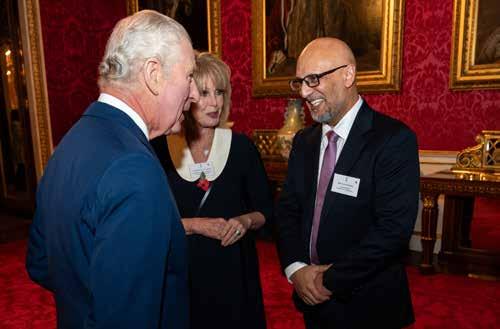
NatWest Group, part of the RRN, sponsored two events to mark our 60th anniversary — one in Belfast and one in Edinburgh — while the Lord Provost of Glasgow hosted an event in the City Chambers bringing together supporters, fundraisers, DEC partners and representatives of diaspora communities from places the DEC has supported. There was a live performance from long-standing DEC supporters Belle and Sebastian.
Our newest RRN partner, The i Paper, also published a ‘big read’ feature on the DEC’s 60th anniversary, including an interview with Saleh Saeed. There was also a feature in the Herald.
Our history
The DEC was formed after a cyclone hit Sri Lanka in 1963 and the High Commissioner in London broadcast an appeal to the UK public to help. Major broadcasters began to envisage a situation where they might face requests from separate humanitarian agencies that they would find difficult to refuse.
Lord Astor, chairman of the Standing Conference of British Organisations for Aid to Refugees, proposed that relief agencies and interested parties should cooperate closely to provide relief after a disaster overseas.
The British Red Cross agreed to co-ordinate and the Disasters Emergency Committee was recognised by the BBC as a representative body.
From five original members of the DEC — the British Red Cross, Save the Children, Inter-Church Aid (now Christian Aid), the Oxford Committee for Famine Relief (now Oxfam) and War on Want — there are now 15 member charities and an ever growing Rapid Response Network of corporate and media partners.
The DEC’s first appeal came three years later in response to an earthquake in Varto, Turkey (now known as Türkiye), in 1966. Sixty years on, our partners are responding to the Turkey-Syria Earthquake Appeal.
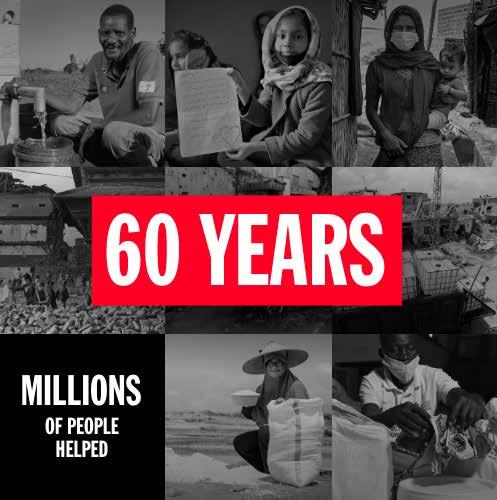
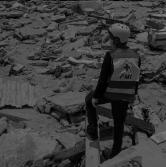
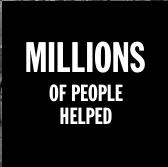
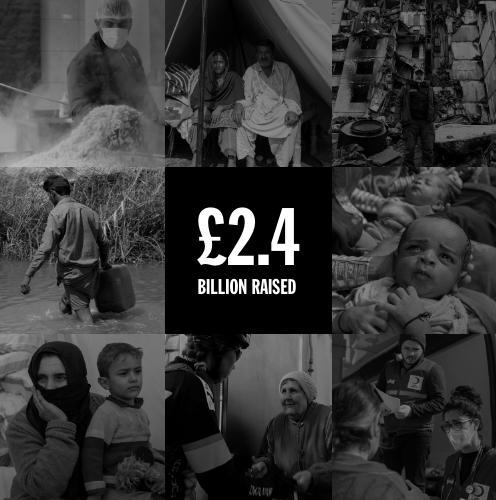

“As we face challenging times both at home and across the world, I am incredibly proud of the work of the DEC and its member charities over the last 60 years. With the generous support of the UK public, the DEC has supported communities in over 60 countries, helping people to survive and recover in the wake of all kinds of disaster.”
Saleh Saeed, DEC Chief Executive

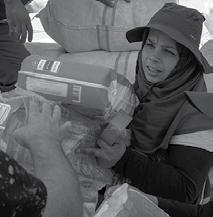

When large-scale disasters hit countries without the capacity to respond, the DEC brings together 15 leading UK aid charities to raise funds quickly and efficiently. In these times of crisis, people in life-and-death situations need help and our mission is to save, protect and rebuild lives through effective humanitarian response.
has 15 members, as

• Providing an accredited national forum for joint fundraising by UK charitable voluntary sector NGOs (“agencies”) in order to maximise the funds raised and facilitate immediate commitment from participating agencies
• Creating a focal point for the response of the public, broadcasters and others to such disasters
• Facilitating agency cooperation, coordination and communication
• Ensuring that funds raised are used in an effective, timely, fully accountable way.
A world where the impact of disasters on affected communities is minimised by working together through effective humanitarian response and growing resilience.

1 Launch the right appeals, at the right time using agreed criteria and working closely with our Rapid Response Network partners
2 Maximise the money we raise for each appeal through constant improvement across our existing income streams, and continue to develop insights about current and prospective donors
3 Increase the impact of the funds we raise for the people and communities affected by crises by ensuring funds are used efficiently and effectively, supporting adaptive programmes that best meet the needs of affected people, and evaluating DEC-funded work
4 Preserve and strengthen the public’s willingness to donate to humanitarian crises overseas positioning the DEC as the ‘central coordinator’ of the UK’s fundraising appeals for humanitarian crises and applying learnings from audience research. The

Together we will raise funds to save, protect and rebuild the lives of people that are impacted by emergencies and major disasters in countries overseas. We will:
• Raise funds quickly and effectively in large scale humanitarian emergencies
• Uphold the highest standards of accountability and transparency
• Learn and share information to promote effective programmes of response.

The DEC responds to the world’s worst disasters using a set of criteria to help us decide when we launch an appeal and how we can be most effective.
• The disaster must be on such a scale and of such urgency as to call for swift international humanitarian assistance.
• The DEC member charities, or some of them, must be in a position to provide effective and swift humanitarian assistance at a scale to justify a national appeal.
• There must be reasonable grounds for concluding that a public appeal would be successful, either because of evidence of existing public sympathy for the humanitarian situation, or because there is a compelling case including the likelihood of significant public support should an appeal be launched.
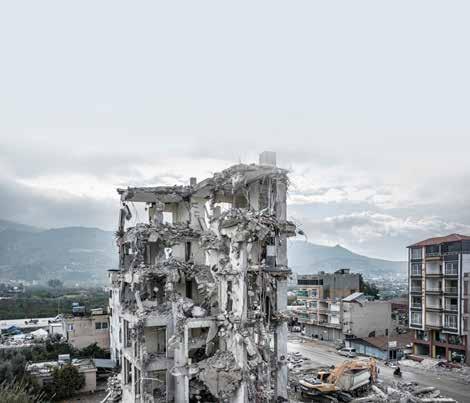
Our priority is delivering aid and support to those that need it, quickly and efficiently. Decisions about how we allocate your money to each of our members when a disaster strikes are taken in advance, based on a calculation of the indicator of capacity (IoC) assessing each member’s ability to fundraise as well as deliver aid where it is needed. We make certain that how we spend your money ensures that communities receive the urgent humanitarian aid required, as well as support to rebuild their lives after a disaster.
The DEC’s work is governed by a commitment to best practice and being accountable to both our donors and those affected by disasters. Our high standards begin with our membership, for which we have a strict set of criteria to make sure that the DEC is made up of the UK’s leading aid charities. We conduct and publish regular independent programme evaluations to check our members’ disaster responses are really helping the communities that need them most.

We only launch an appeal when all the criteria are met. During this reporting period — 1 April 2023 to 31 March 2024 — the DEC did not launch any new appeals.
Every year, DEC staff work closely with our member charities and Rapid Response Network (RRN) to monitor new and ongoing crises. We assess against three criteria: the scale and urgency of the disaster, the ability of our member charities to provide effective and swift humanitarian assistance, and the likelihood that the public would support an appeal. Not every crisis meets all three.
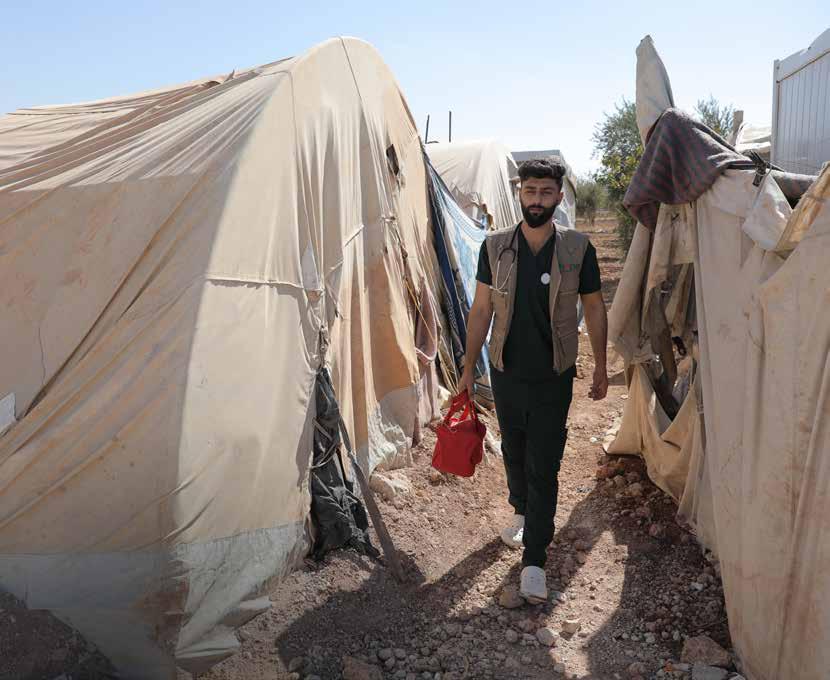
This year we closely monitored the devastating conflict in Gaza and Israel, which has escalated since October 2023. During our reporting period the limited access for humanitarian aid to enter Gaza meant that not all of our launch criteria could be met. However, 14 DEC member charities launched appeals to help civilians affected by the conflict and have been able to deliver significant aid programmes. We directed people seeking to donate to our member charity appeals via our website and social media.
We also continued to monitor the conflict in Sudan, which broke out in April 2023 and has led to a massive humanitarian crisis with more than six million people fleeing their homes and severe food shortages, as well as the ongoing East Africa hunger crisis where an estimated 89 million people are acutely food insecure. In September 2023 we assessed the earthquake in Morocco and the dam collapse in Libya. While all these crises are deeply concerning, they did not meet all the criteria for launching appeals. However, several DEC member charities have a presence in these countries, either directly or through local partners, and have been responding.
Our member charities continued their work on four DEC appeals, supporting communities in Afghanistan, Pakistan, Ukraine, Poland, Romania, Moldova, Hungary, Turkey and Syria (see pages 12-21 for more details of this work). And we continued to accept donations for the Pakistan Floods Appeal (until it closed in December 2023), the Ukraine Humanitarian Appeal and the Turkey-Syria Earthquake Appeal, which remained open at the end of the financial year.
Although we have not launched any new appeals, our flexible funding strategy allows DEC member charities to respond to unforeseen developments and changing needs in places where they are already working through our existing appeal programmes. As a result, our members were able to use DEC appeal funds to respond quickly to the earthquake in Herat, Afghanistan, in October 2023, the Kakhovka dam breach in Ukraine in June 2023, and extreme weather conditions in
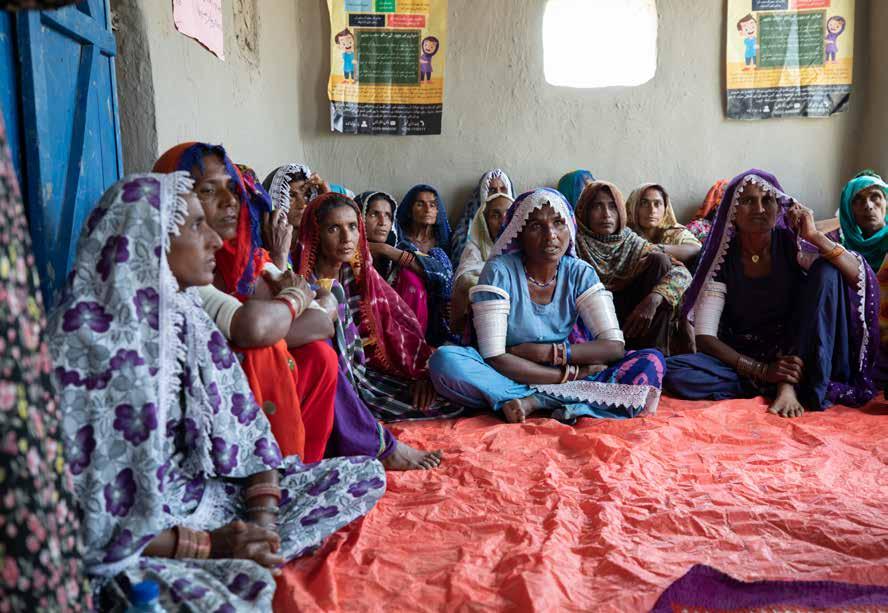
This year the DEC continued to accept donations for the Pakistan Floods Appeal, the Ukraine Humanitarian Appeal and the Turkey-Syria Earthquake Appeal. The Ukraine and Turkey-Syria appeals — two of the largest in the DEC’s 60-year history — remained open this financial year. The Pakistan Floods Appeal closed in December 2023.
The Ukraine Humanitarian Appeal was launched in March 2022 following a dramatic escalation in conflict and has now raised £437 million including £25 million matched by the UK Government through the UK Aid Match scheme. Funds will be spent up until the end of February 2025.
The Pakistan Floods Appeal was launched in September 2022 when heavy monsoon rains led to some of the worst flooding in the country’s history. The appeal raised £50 million in total, including £5 million matched by the UK Government through the UK Aid Match scheme. This appeal closed in December 2023. Appeal funds will be spent up until the end of August 2024.
The Turkey-Syria Earthquake Appeal was launched in February 2023 after two devastating earthquakes in Turkey killed more than 56,000 people. The total raised by 31 March 2024 was £162 million including £5 million matched by the UK Government through the UK Aid Match scheme. This made the DEC the biggest charity donor to the earthquake response, according to UN OCHA’s Financial Tracking Service, and the appeal is the third biggest in the DEC’s history. Funds will be spent up until the end of January 2025.


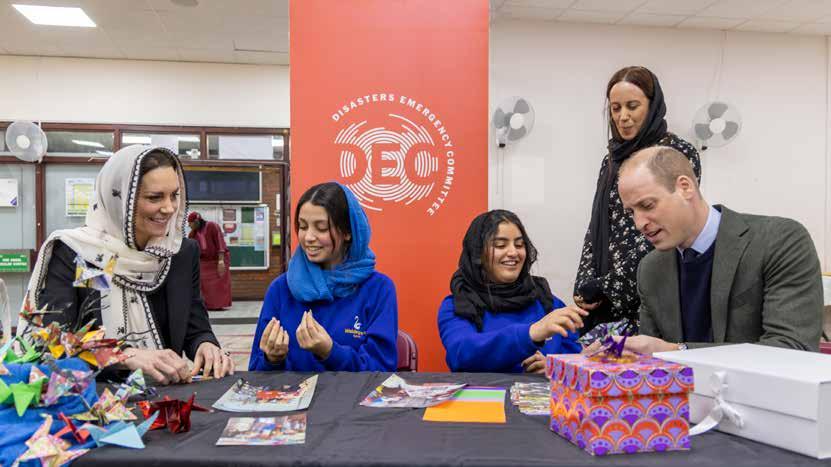

Feedback campaigns are a vital part of our fundraising. By showing our supporters and the wider public the impact of their donations, we can help to build their trust in the DEC and the effectiveness of humanitarian aid, thereby increasing their confidence when responding to emergency appeals in the future.
This financial year we ran reporting back campaigns for three of our appeals (Pakistan, Ukraine and Turkey-Syria) with a wide range of communications and marketing activities. These included press releases, short films and videos, reports, photography exhibitions, celebrity and media trips, adverts, social media updates and emails to supporters, key donors and partners. Private webinars featuring speakers from our member charities were also held to report back on our work to high value donors, corporates, trusts and foundations. For more detailed information about the reporting back campaigns see Goal 4 (page 22).
The DEC continued to develop its partnerships and networks in the UK nations, deepening our relationship with audiences in Scotland, Wales and Northern Ireland.
In Wales the DEC hosted a Ukraine Humanitarian Appeal feedback event at the Senedd in Cardiff at the end of March 2023, which was attended by Senedd members, key corporate and third sector partners and DEC member charities based in Wales. The fundraising totals in Wales increased to £15.3 million (Ukraine), £1.4 million (Pakistan) and £4.8 million (Turkey-Syria). The oneyear-on reporting back campaign for the Turkey-Syria Earthquake appeal was particularly successful, supported
by a range of bilingual media content, including the DEC’s first Welsh language hero film, The Locker/Y Locer. Political, corporate and third sector contacts received bilingual updates on our work for all three reporting back campaigns and media interviews were conducted on each, as well as on the DEC appeal criteria and 60th anniversary.
In Scotland the DEC secured strong media coverage on our feedback campaigns. An estimated £38.4 million (Ukraine), £5.0 million (Pakistan) and £13.7 million (Turkey-Syria) have now been raised for those appeals in Scotland. Key RRN partner, NatWest Group, hosted an appeal feedback reception in Edinburgh attended by Scottish Government External Affairs Cabinet Secretary. In February, Glasgow’s Lord Provost, Jacqueline McLaren, also hosted a 60th anniversary celebration in the City Chambers, bringing together supporters, fundraisers, DEC partners and representatives of diaspora communities from places the DEC has supported, including Ethiopia, Syria, Turkey, Somalia and Pakistan. There was a live performance from longstanding DEC supporters Belle and Sebastian. The DEC also gave a presentation to the COSLA annual convention, the gathering of the leaders of all of Scotland’s local councils.
In Northern Ireland a private ‘thank you’ dinner, hosted by NatWest Group, was held in Belfast to mark the 60th anniversary. It was an opportunity to thank corporate and political supporters, while introducing the DEC to new corporate partners. It also provided a chance to report back on our appeals.
The Isle of Man Government donated £100,000 to the TurkeySyria Earthquake Appeal this financial year, in addition to the £100,000 they gave at the appeal launch.
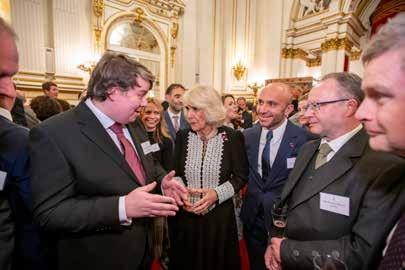
We are grateful for the continued support of our Rapid Response Network (RRN) of media and corporate partners whose communications channels dramatically increase the reach of our appeals and campaigns.
This year we added one new corporate member, the Co-operative Bank, and one new media member, The i Paper, to the RRN.
The DEC receives incredible support from the retail banking sector and so we were delighted to formalise our partnership with the Co-operative Bank at the beginning of 2024. The bank has supported the last three consecutive DEC appeals, raising over £750,000 collectively by harnessing the generosity of their customers and colleagues. They will continue to support our appeals with communications to employees and customers,

raised by their readers through significant media coverage — the DEC signed a memorandum of understanding in July 2023 to make The i Paper part of the RRN. The Paper is the first newspaper partner to join the RRN.
In February this year Molly Blackall, The i Paper Global Affairs Correspondent, travelled to Gaziantep in Turkey to visit DEC-funded projects. She wrote three features after witnessing work carried out by local partners of DEC member charities Action Against Hunger, Oxfam and the International Rescue Committee. The i Paper also published a “big read” feature on the 60th anniversary of the DEC.
In July 2023, a team from DEC partner British Airways travelled to Warsaw, Poland, to see work funded through the Ukraine Humanitarian Appeal. This year also marked the ten-year anniversary of the airline’s partnership with the DEC, during which time British Airways has raised £2 million for DEC appeals.
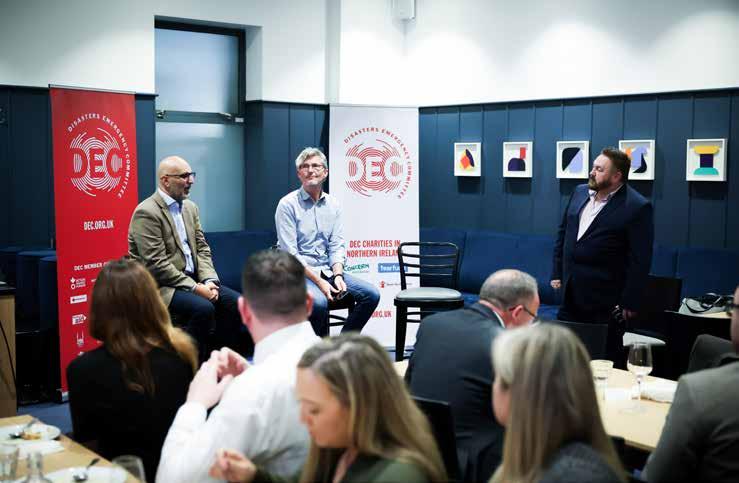
The total income for each appeal includes both donations made
from the point of appeal launch to 31 March 2024. The DEC income includes appeal
income spreads over more than one financial year.
Total funds raised for DEC appeals
UK Government Aid Match and Gift Aid
During the last five-year strategic period (2019-2024), the UK Government pledged £55
appeals. This includes £25 million for the Ukraine Humanitarian Appeal. These UK Aid Match commitments provide a further incentive for the UK public to donate to DEC appeals.
During the year, the DEC received Gift Aid reclaims from the UK Government on
(2023: £13 million).
Local aid worker Muhammed works with an earthquake-affected
project are taken on board.
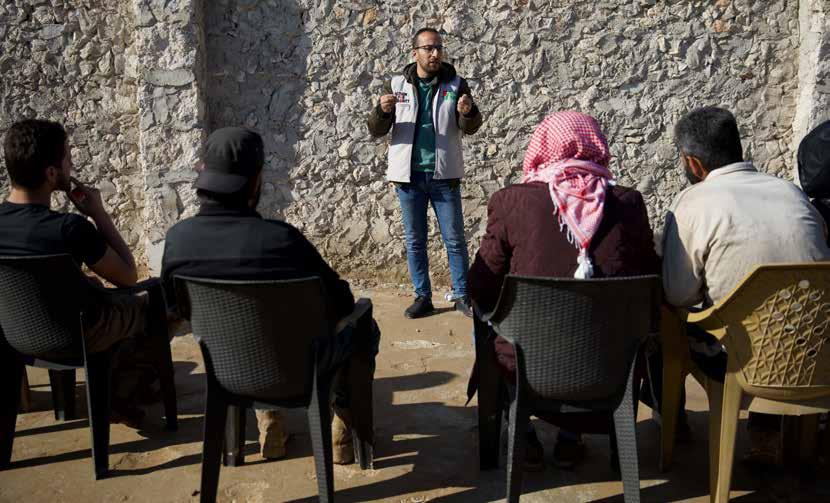

pushed millions to the brink of famine. Overall the appeal raised £52.6 million, including £29.8 million in direct donations to the DEC, £10.0 million in UK Aid Match from the UK Government, and £12.8 million donated to member charities. The appeal has now closed.
We report on funds that come directly to the DEC (£39.8 million including £10.0 million UK Aid Match). Member charities and local partners report on income that comes directly to them.
From December 2021 to December 2023, 13 DEC member charities and their local partners provided vital support to an estimated 2.7 million* people, responding in two phases of work.
In the first six months they prioritised urgent needs, such as food, health, shelter and water, multi-purpose cash assistance, sanitation and hygiene. During the second phase — July 2022 until the end of December 2023 — our members and their partners continued to support people to meet their essential needs, while also helping to rebuild livelihoods, increasing the ability of families and communities to cope with future shocks.
For example, food packages and multi-purpose cash assistance helped people to feed themselves and their families, while mobile health units brought essential healthcare to remote communities.
soil management. Grants enabled communities to buy equipment and livestock, helping them to produce crops.
When earthquakes hit Herat province in October 2023, several DEC charities used funds from the appeal to support survivors, highlighting the flexible nature of our funding which allows members to remain agile in response to changing needs.
Operating in an environment with severe restrictions, member charities and their partners faced huge challenges. One of the greatest of these challenges was the government banning women from working in the humanitarian sector in December 2022. Female aid workers are essential in any response, but particularly in Afghanistan, where it would not be culturally appropriate for male staff to interact with women in many settings. DEC charities used their long experience to innovate and adapt, integrating other forms of support into health and nutrition programmes, where female staff were still allowed to work.
The DEC and member charities use learning from past and current emergency responses to make sure funds are used appropriately and programmes meet the highest standards. We took measures
to ensure that projects were accountable to communities, supported a locally-led response, had robust safeguarding policies in place to protect the welfare of vulnerable adults and children, and protected the environment.
Furthermore, at the end of the appeal in December 2023 we commissioned a learning and improvement review. Key lessons included the importance of looking after the mental health of staff and volunteers working for partner organisations; making sure marginalised groups such as women can be involved in home-based projects to bypass societal and operational barriers; recognising the need to integrate disaster risk reduction and climate resilience into humanitarian programmes; and the need to be flexible and prioritise projects in response to the changing needs of communities.
After decades of conflict, instability and the recent earthquakes, the situation in Afghanistan is still critical. The DEC appeal has now ended, but member charities and local partners are determined to keep doing what they can to support the people of Afghanistan. Some of our members have secured extra funding to continue their work.
713,000 people including mothers with young children given access to primary healthcare
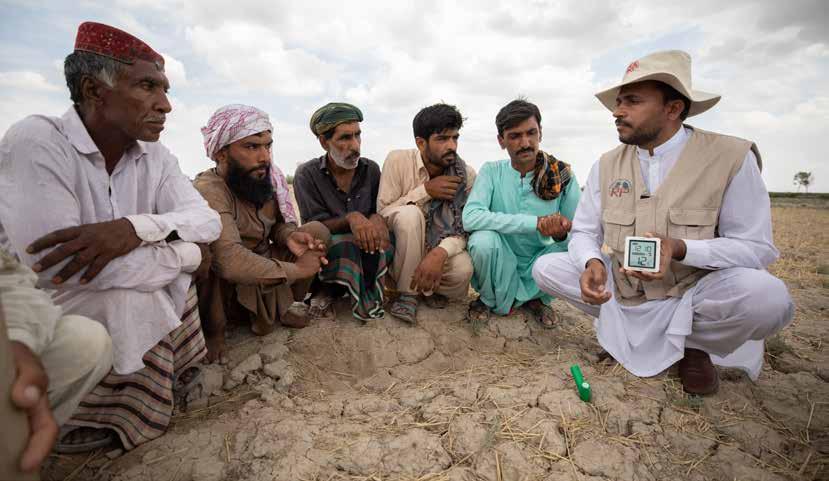
On 1 September 2022, the DEC launched an appeal to provide urgent aid to the millions of people affected by some of the worst floods in Pakistan’s history. The water destroyed thousands of homes, schools and health facilities and contaminated crucial water sources. It also damaged extensive areas of crops and killed 1.2 million livestock, wiping out the main source of income for many communities and leaving over 14 million people in need of emergency food assistance. The floods affected an estimated 33 million people across 94 districts.
The appeal raised a total of £50 million, including £5 million in UK Aid Match funding from the UK Government and £11.8 million raised by DEC member charities. The income channels closed in December 2023.
The first six months of the programme focused on helping people to meet their immediate needs, with our member charities providing emergency shelter, clean water, food, healthcare and cash payments.
The second phase, which began in March 2023 and will run until the end of August 2024, prioritises helping flood-affected communities recover and rebuild their livelihoods, as well as
supporting activities to mitigate the impact of future floods, including planting trees that can help absorb rainwater and reduce coastal erosion, and offering training on topics such as climate change awareness, disaster risk management, environmental risk factors, first aid and climate-smart agriculture. So far communities have planted more than 110,000 trees.
For those who don’t have access to enough land to grow crops, projects are focusing on income-generating activities such as poultry farming, distributing livestock such as goats and providing vocational skills training and cash grants to support the growth of small businesses.
In addition, our member charities have continued to help the most vulnerable meet their basic needs, including providing nutrition support and cash assistance, so people can feed themselves and their families, as well as rebuilding water points and distributing hygiene kits.
Between March 2023 and February 2024, DEC member charities and their local partners helped around 1.45 million* people. In this period, £9.8 million was spent out of a total Phase 2 budget of £24.1 million.
£21.6 million expenditure (September 2022 – February 2024) 1.45 million* people estimated to have been helped with DEC funds
March 2023 – February 2024
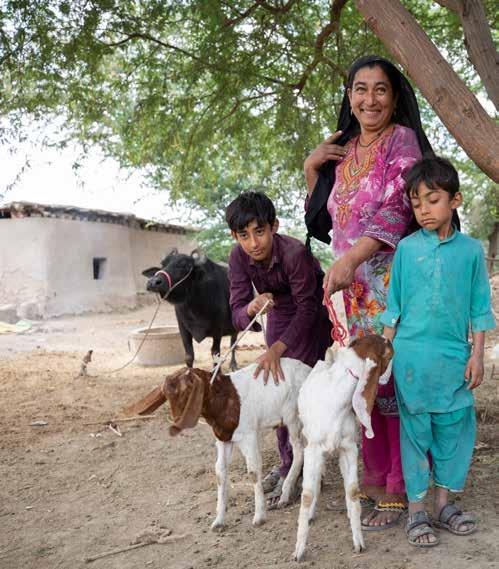
efforts have been made to avoid counting people twice, some people may have been helped more than once by different member charities.
452,800
people given access to quality basic health services including mothers with young children
183,700
people given access to safe drinking water
78,300
people provided with hygiene and dignity kits, containing items including soap and toothpaste
94,300
people given agricultural support such as seeds, training on livelihoods and income generating activities
21,500
people accessed mental health and psychosocial support services
86,600
people received cash to purchase food, restore their livelihoods, or meet basic needs
250,700 children screened and 33,300 treated for malnutrition
82 education spaces established or rehabilitated
181 disaster risk reduction plans developed in collaboration with community committees
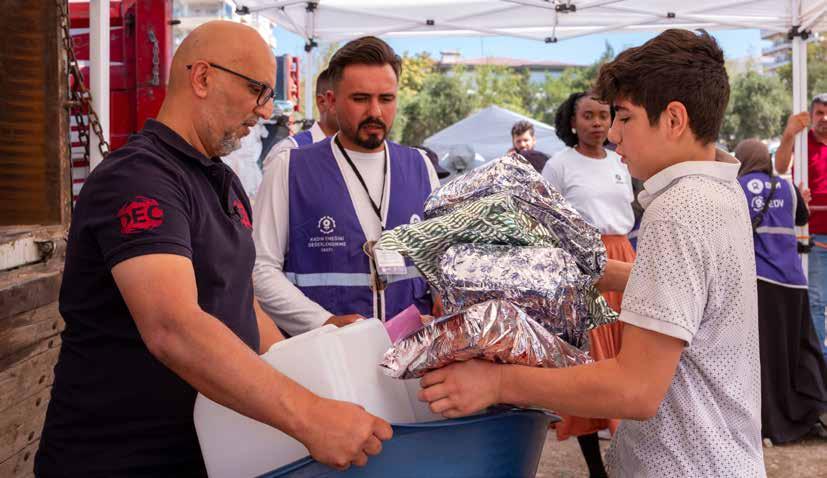
earthquakes killed more than 56,000 people in Turkey and north-west Syria and destroyed or badly damaged more than 300,000 buildings. More than 18 million people were directly affected by the earthquakes. By 31 March 2024, the total raised by the appeal was £162.1 million. Of this, £113.9 million was raised by the DEC, including £5.0 million matched by the UK government through the UK Aid Match scheme. The remaining £48.2 million was raised directly by DEC member charities using DEC co-branding.
Since the launch of the appeal, fourteen DEC member charities and their partners have spent £44.8 million reaching more than 2.2 million* people affected by the earthquakes.
More than one year on, many thousands of people in Turkey are still living in makeshift camps and continue to face challenges such as water shortages and inadequate sanitation. In northwest Syria the earthquakes exacerbated twelve years of ongoing hostility and instability. The United Nations estimates that 16.7 million Syrians will need humanitarian assistance in 2024 — 10 per cent more than in 2023.
In the first six months of the response the priority was to meet the immediate needs of the most affected communities, providing food, shelter and cash payments, repairing damaged water infrastructure, building toilets and setting up mobile health clinics.
£44.8 million
expenditure (February 2023 – January 2024) 2.2 million* people estimated to have been helped with DEC funds
In the second six-month phase (August 2023 to January 2024), activities have shifted towards longer term support, including restoring people’s livelihoods, while still helping to meet the basic needs of the most vulnerable people affected by the disaster.
In Turkey, nine DEC member charities and their partners have been helping communities by improving access to drinkable water and hygiene and sanitation facilities in the remaining refugee camps, providing mental health and psychosocial support, distributing cash and voucher assistance, and helping people rebuild their livelihoods. For example, farmers have received farming equipment, technical assistance and veterinary services for livestock, while others have received vocational and entrepreneurship training.
Meanwhile, in Syria fourteen DEC member charities have reached thousands of people by providing access to primary healthcare (through the rehabilitation of healthcare facilities and distribution of healthcare equipment) and mental health and psychosocial support, and providing water, hygiene and sanitation services and multi-purpose cash assistance. Projects also support income generating activities such as offering grants for small businesses.
Over this six-month period, £3.7 million has been spent in Turkey and £13.3 million has been spent in Syria. The programme will run until 31 January 2025.
Phase 1 key achievements in TurkeySyria from February 2023 to July 2023:
269,000
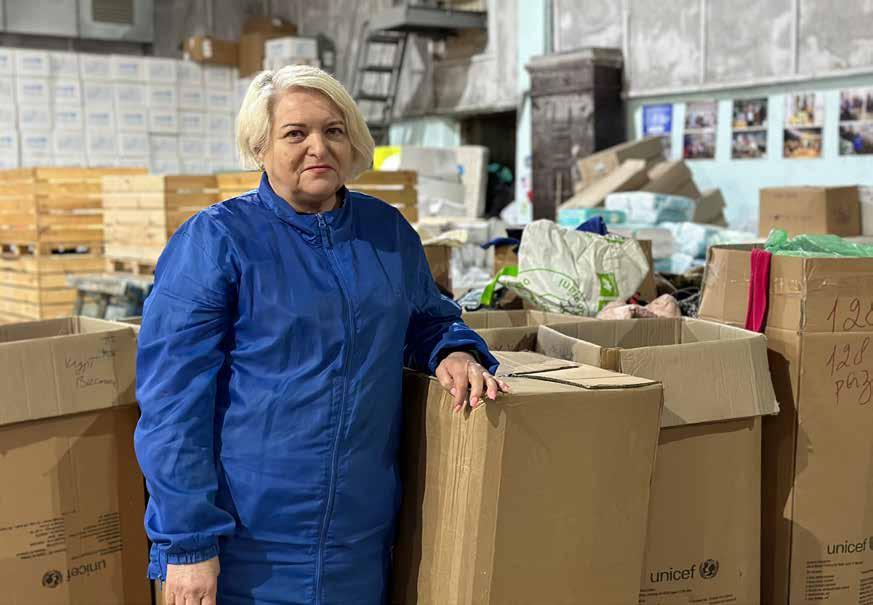
The DEC launched the Ukraine Humanitarian Appeal in March 2022 following a dramatic escalation in conflict. Two years on, the appeal has raised £437 million including £25 million matched by the UK Government, making it one of the largest DEC appeals of all time. The incredible amounts raised have helped to support 8.2 million* people in Ukraine and neighbouring countries. There are thirteen DEC member charities involved in the response, working with local partners on 37 projects in five countries: Ukraine, Poland, Romania, Moldova and Hungary. Programme work will run until the end of February 2025.
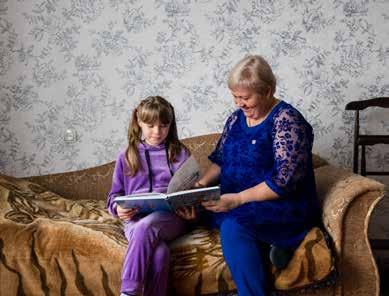
EXPENDITURE BY SECTOR
865,000 people
463,000 people
Two years on from the launch of the appeal, DEC member charities and their local partners have spent £223.9 million on programmes in five countries. The majority of DEC aid expenditure has been inside Ukraine (58%), helping people meet their basic needs by providing cash payments, food, shelter, hygiene items, healthcare, mental health support and by repairing damaged water and sanitation infrastructure.
Funds from the Ukraine appeal have also been used to support refugees with the basics, such as food, medical support and clothing, and to settle into new countries. Refugees have been helped to access longer term accommodation, legal advice and language classes. DEC member charities and partners have also organised events to bring refugees and host communities together, so that refugees get to know the cultures of their host countries and refugee and host children can play together.
89,300 people received legal assistance and advice
149,000 people reached with mental health support
187,000 people provided with hygiene and dignity kits
25,000 adults and children took part in integration and social cohesion activities
As the conflict has worn on and the humanitarian crisis continues to evolve, DEC charities have responded to new developments in Ukraine and neighbouring countries.
The constant movement of people, the changes in the presence of humanitarian organisations, funding availability and the insecurity in Ukraine have all meant that it’s been important for member charities and local partners to adapt their work. For example, with the attacks on energy infrastructure, the DEC’s flexible funding model allowed member charities and local partners to adapt their plans. Organisations could direct funds where they were most needed, supplying and installing generators for people without electricity and the means to keep warm and dry.
As the frontline of the conflict moved, DEC member charities have also adapted their activities in response. For example, when areas of Kharkiv Oblast were retaken by Ukrainian forces, charities provided aid to people in villages in the
area and began repairs to homes in Kharkiv city. They also began working in Kherson city after it was retaken by Ukraine, going on to help people affected by the destruction of the Kakhovka dam and subsequent flooding in June 2023.
While fighting continues to drive people from their homes, for many displaced people in Ukraine – and refugees who have fled to neighbouring countries – life is very different. From setting up temporary, emergency accommodation, DEC charities are now focusing more on providing longer term accommodation. And while at the beginning of the response DEC funds were used to help the millions of refugees meet their basic needs, now our member charities are looking at people’s longer term needs. For example, DEC funds are also being used to set up specialist centres where refugees can access various kinds of support, including mental health services, language courses and childcare.

The DEC is incorporating innovative ways of working into its appeal responses to make projects more efficient and effective and bring value for money.
This new approach is based on a two track method. The first track (known as Engine 1) uses tried-and-tested means to deliver aid quickly, such as providing food, clothes and access to housing. The second (Engine 2) invests in trying new approaches, giving DEC member charities and their partners the space to experiment with new models and ways of working, driven by staff on the ground and communities’ needs.
Examples include research, capacity strengthening, collective work and new partnerships, with a focus on safeguarding, localisation, accountability to affected populations and information as aid.
The aim is not only to provide aid where it is most needed but also to improve the way that the aid system itself works, in order to strengthen future humanitarian responses.
The Ukraine Humanitarian Appeal was the first DEC response to put the dual approach into practice. So far over £10 million has been spent on innovation projects in Ukraine, Poland, Romania, Hungary and Slovakia. This approach is now underway in Turkey and Syria as well.
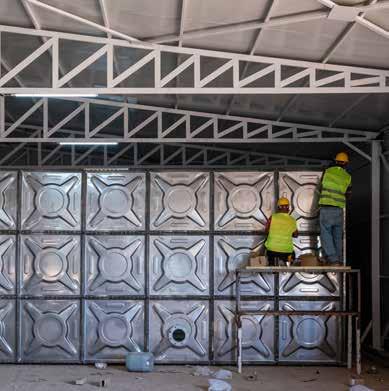
The biggest Engine 2 project within the Ukraine Humanitarian Appeal is Sustainable Humanitarian Innovation for Transformation (SHIFT), a £10 million partnership between Save the Children and an independent partner.
SHIFT aims to transfer power to the most affected – and best placed to respond – by providing training, coaching and mentoring, research and analysis, cash and voucher assistance, grants and professional advice and services in Ukraine, Poland and Romania. SHIFT is also now active in the Turkey-Syria Earthquake Appeal response.
SHIFT has:
strengthened local leadership by creating an Eastern European Regional Centre as part of its response increased engagement of country office staff and local actors in decision making and established a network to promote dialogue and debate created new partnerships between local groups supported the growth of local entrepreneurs by providing grants of up to US$15,000, boosting their revenue growth by five to twenty per cent.
Collaborative Cash Delivery Network (CCD), is a global network of international NGOs working together to improve the quality and delivery of cash and voucher assistance in humanitarian crises. It received £3.3 million as part of the Ukraine appeal to expand its services to support aid agencies to deliver cash effectively and efficiently within Ukraine, Poland and Romania.
As part of the Ukraine Humanitarian Appeal, the CCD has:
provided flexible and accessible funding to grassroots initiatives, enabling local communities to define their own priorities in terms of multi-purpose cash assistance
facilitated communication and collaboration between international actors from the Cash Working Group and local NGOs
contributed to evidence-based decision making, resulting in concrete changes to local cash and voucher projects, thanks to evidence generated by the project.
Reporting back to our donors, partners and sponsors on the work that has been done thanks to their support is a key part of building people’s trust in the effectiveness of humanitarian aid and of deepening their support for emergency appeals.
Our approach increasingly uses storytelling, based on detailed case studies, to give a platform and voice to the people at the heart of our work. These case studies, photographs and videos connect recipients with donors directly, showing the UK public how their money is helping.
As well as regular updates throughout the year across our social media channels, website and supporter emails on how DEC funds are being spent, we also delivered three key reporting back campaigns, marking one year on from the Pakistan floods, the first anniversary of the Turkey-Syria earthquakes, and two years on from the escalation of conflict in Ukraine. A wide range of communications and marketing activities were used, including press releases, short films and videos, reports, photography exhibitions, celebrity and media trips, adverts, social media updates and emails to supporters, key donors and partners.
In June 2023, marking one year on from the monsoon rains that triggered the worst floods in Pakistan’s history, his Majesty the King met members of DEC charities and DEC Chief Executive Saleh Saeed to hear about the impact of UK donations for those affected by the disaster. A report was released on the DEC website detailing how donations have helped hundreds of thousands of people recover and rebuild.
The DEC also made a video of a mobile health clinic truck that has been uniquely decorated by a local Pakistani truck artist to tell the stories of flood survivors supported by the appeal. The truck, funded by DEC member CAFOD, was still providing mobile healthcare in villages that were submerged last year. Case studies and videos of members of the communities supported by the projects – covering shelter, clean water, food and healthcare –were also posted to social media.
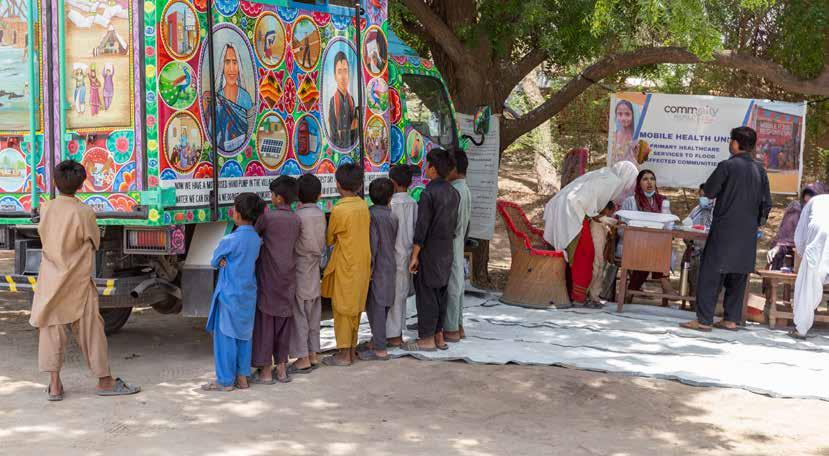
A private webinar was held for high value donors, corporates, trusts and foundations to report back on the appeal. The panel included speakers from our member charities and the truck artist Ali Salman Anchan, who was able to talk about the project.
Meanwhile, communications activities were developed to report back specifically to the cricket community, which had generously supported the appeal in 2022. The England and Wales Cricket Board published a blog by our Chief Executive on their website, following his trip to Pakistan to visit DEC-funded projects. Saleh Saeed was also interviewed on BBC Test Match Special and a photography exhibition was held at Emirates Old Trafford in Manchester.
Launched in February 2024 ahead of the first anniversary of the disaster, the Turkey-Syria reporting back campaign used a wide



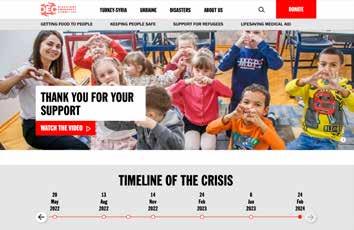
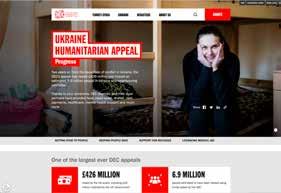

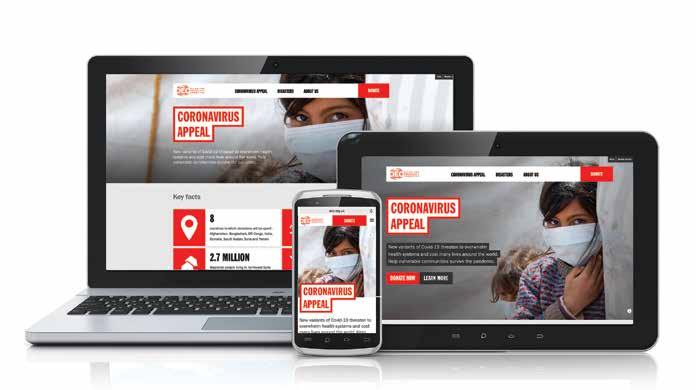
Building on last year’s ambitious 2023 ‘Ukraine: one year on’ campaign, the second anniversary reporting back campaign focused on two key messages: that £430.7 million had been raised by the appeal, and that these funds enabled our member charities and their partners to support 6.9 million people, a statistic generated via a new methodology used by the DEC programmes and accountability team. A DEC press release highlighting this was reported on by the MailOnline, The Mirror, The Independent and The Evening Standard. In total we received 223 UK media mentions, including on ITV’s Good
release was republished by more than 150 local newspapers, while eight international newspapers published a full-page graphic showing key figures from the release. A short thankyou video was made for social media and case studies were published on social media.
The appeal pages on the DEC website were updated with new information on the response, with a timeline of events.
Between 19-26 February 2024 the website received over 24,000 page-views, of which around 5,700 were on the main
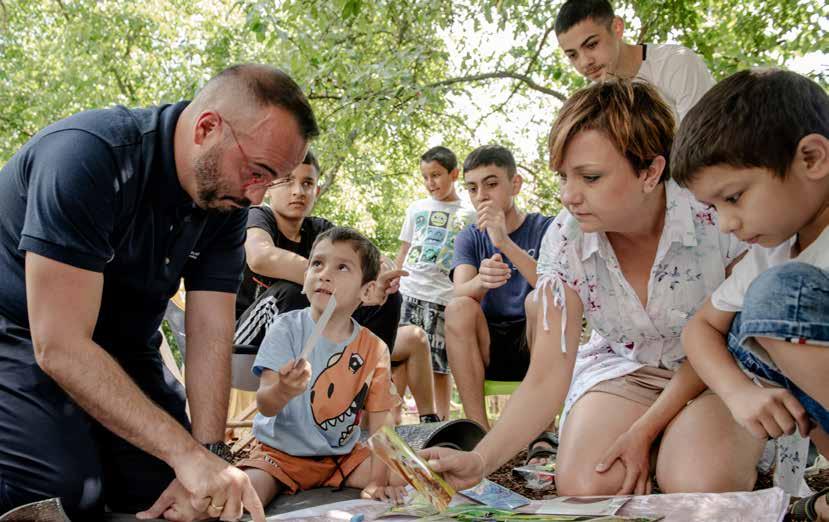
The DEC’s research and learning agenda identifies key subject areas to investigate, as well as regularly conducting reviews and evaluations of our work to identify trends, best practices and areas for improvement. Among the most pressing current challenges and opportunities are: the environment and climate change, accountability to affected populations, localisation (shifting power and influence to local humanitarian actors), safeguarding individuals and local communities, and the use of direct cash transfers, which has become an integral part of our appeals.
In the last financial year the DEC has carried out a range of learning activities, built into its appeals, including community perception surveys in Afghanistan, Pakistan, Turkey and Syria, a learning review in Afghanistan, a study mapping cash responses and what people did with the money they received as part of the Ukraine regional response, and research in partnership with the London School of Economics looking at climate adaptation in DEC programming in Pakistan and the wider humanitarian sector. The DEC also commissioned a learning review of the last strategy period (2019-2024) and the six appeals that were launched during this time, helping to identify areas of progress and ongoing challenges which can be carried forward into the next strategic period.
These activities support our work on increasing the impact of the funds we raised under Goal 3 of our strategy. Further details on this strategic goal can be found on page 12.
In late 2023 the DEC commissioned a study to look at partnerships across its membership, as we believe one of the best ways to empower local humanitarian groups is by strengthening their partnerships with local and national organisations. The aim of the research, which focused on learnings from three active DEC appeals across Afghanistan, Pakistan, Turkey and Syria, was to better understand what is needed to support quality and equitable partnerships in order to reinforce their role in crisis response. The DEC Secretariat and members will use the findings to establish a shared vision and plan for achieving this goal.
Over the past year the DEC Secretariat and members have been closely involved with the revision of the Core Humanitarian Standard (CHS), which sets out globally recognised commitments to ensure that organisations support people and communities affected by crisis in ways that respect their rights and dignity. The new CHS was launched in March 2024, and the DEC will be integrating the revised standard into its work over the next financial year.
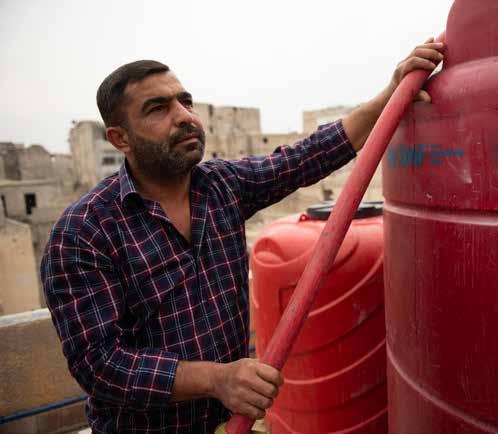
This year the DEC developed a new five-year strategy as our previous five-year strategy came to an end. The new strategy will help us continue to deliver on our mission as we face changes and challenges in the years ahead. The emergencies we respond to are ever more complex, impacted by geopolitics and climate change. Technology is advancing, media consumption is shifting and new audience needs are emerging. Our new strategy ensures we remain a thriving, sustainable organisation able to launch the right appeals at the right time, and build trust with our audiences.
The new strategy underpins our mission to raise funds to save, protect and rebuild the lives of people impacted by major disasters in countries without the ability to respond at scale. At its heart is a vision of the world where the impact of disasters is minimised by working together through effective humanitarian response and growing resilience. The incredible scale of appeals in the previous five-year strategy — raising £763 million across five appeals — unequivocally proves we are stronger together than the collective sum of our parts.
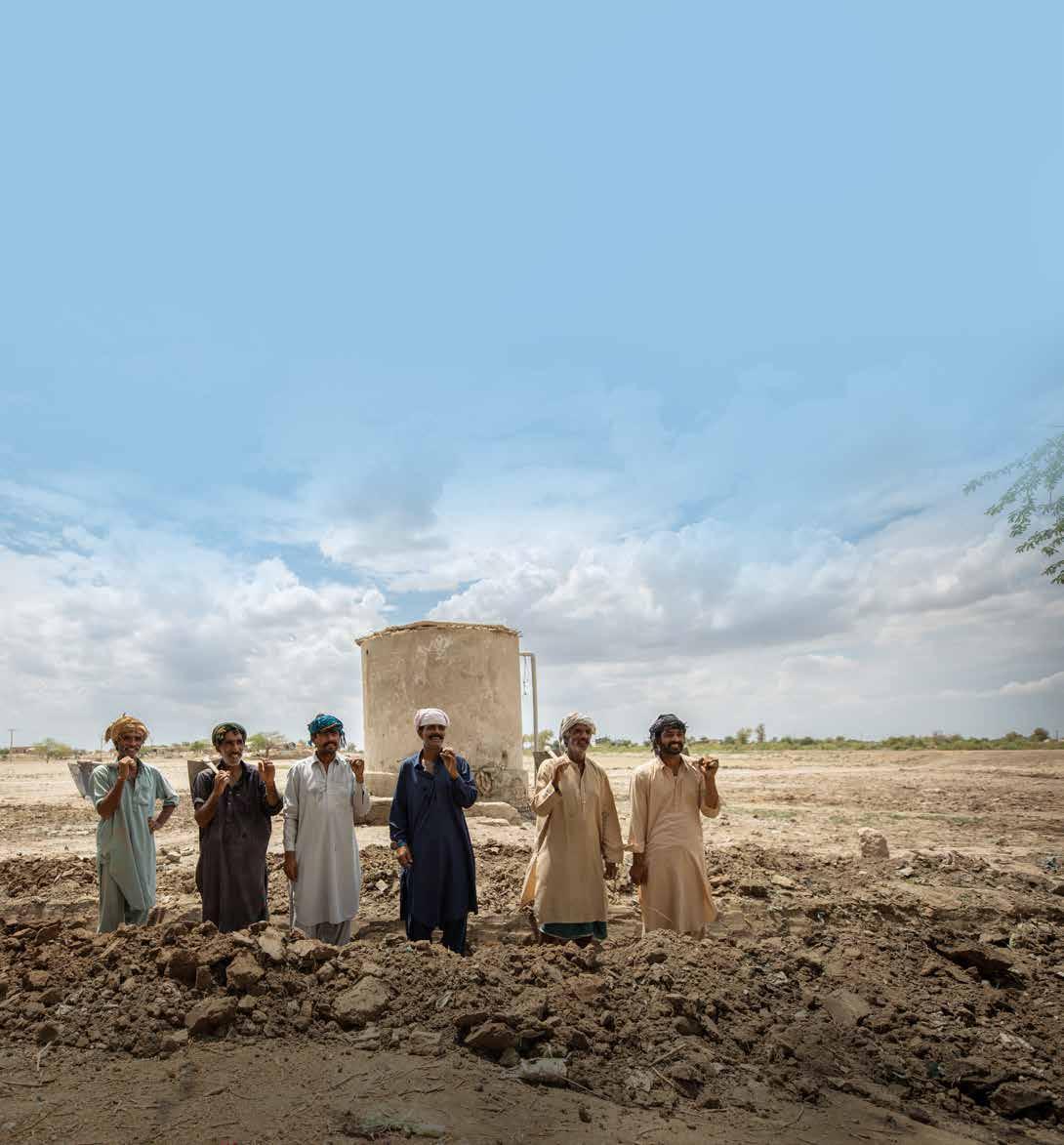
Working with and through our member charities and the Rapid Response Network we will prioritise our activities under the following strategic pillars

1 2
• Maximise appeal income: We will maximise appropriate opportunities to raise money during appeals.
• Grow our partnerships: We will develop our relationships with key partners that provide us both reach and money to generate the greatest income during appeals.
• Optimise digital and social channels: We will invest in our use of digital and social channels to reach more people, providing them with ways to donate easily and quickly during appeals.
• Prioritise data and targeted technology: We will focus time, energy and resource on our fundraising data management and adopting targeted technological advancements to improve and drive our fundraising efforts.


• Mobilise a ‘whole appeal’ approach to marketing and communications activities: We will formalise a ‘whole appeal’ approach to optimise every meaningful opportunity to engage our audiences.
• Reimagine our supporter experience: We will improve our supporter experience to increase the likelihood of future donations and long term donor value.
• Invest in our existing and future audiences: We will improve our engagement with current DEC supporters and put in place the building blocks to engage our audiences of the future.
• Drive timely, impactful, and authentic content:
We will work even more closely with member charities and local communities to capture and produce engaging content to drive meaningful engagement across multiple channels.
3 4
• Harness our collective impact: We will channel the impact of DEC and member charities so that our humanitarian response is greater than the sum of its parts.
• Influence the sector: We will drive change through our unique position in the humanitarian sector, showcasing our work on flexible funding, and adaptative and innovative programming.
• Explore and strengthen our climate change and protracted crisis response: We will explore the most effective ways for DEC to drive impact, awareness and funds for these humanitarian emergencies.
• Support a shift of power: We will ensure DEC programmes support shifting the power, through amplifying locally led responses and local voices, safe programming, environmental protection and climate adaptation in our programmes, approaches and communications.

• Support our people: We will be a sector leading employer of choice, protecting our strong organisational culture, investing in our teams’ development, and supporting them to thrive.
• Embed Environmental, Social and Governance (ESG) commitments: We will define and act upon our cross-cutting organisational commitment to ESG, embedding improved practices.
• Evolve our financial and risk strategy: We will evolve our current approach to organisational financing and risk, creating a more sustainable organisation better able to withstand future unpredictability and meet regulatory and compliance requirements.
• Invest in our systems and processes: We will review and improve our systems, infrastructure and processes to ensure they are secure, robust, efficient and used effectively.
The DEC has been operating since 1963, and was registered as an independent charity on 4 June 1997. It is incorporated as a company limited by guarantee: we have no share capital, and the guarantee is limited to £1 for each of our 15 members. Our governing document is the Memorandum and Articles of Association of the company.
The DEC Secretariat has a core staff of 36 people (as at 31 March 2024) who run DEC appeals and oversee the use of DEC funds. The DEC plays a large role in fundraising and communications, but also in oversight and accountability, relating to how money raised is spent, and in promoting standards of good practice among members.
Financial review
The financial summary for the year 2023/24 reflects a year when the DEC did not launch an appeal, but continued to receive donations and released funds to our members against existing appeals. Overall, the DEC enters into a new strategic period in a robust financial position to invest in the strategy and deliver against its overall strategic aims.
Total income received directly by the DEC including Gift Aid and bank interest for the year amounted to £32.9 million (2023: £215.7 million). Of this, the DEC Turkey-Syria Earthquake Appeal (launched February 2023) raised £12.5 million, the DEC Pakistan Floods Appeal (launched September 2022) raised £1.4 million and the DEC Ukraine Humanitarian Appeal (launched March 2022) raised £8.0 million. All values include Gift Aid. In addition, DEC received donations and legacies of £2.3 million (2023: £2.7 million).
Total expenditure for the year amounted to £53.7 million (2023: £262.4 million), including £47.3 million (2023: £251.2 million) of appeal funds committed to DEC members for use towards humanitarian programmes and for collective initiative projects, £5.0 million (2023: £10.5 million) in costs of raising funds, and £1.4 million (2023: £0.6 million) of other costs. The DEC’s core
costs are covered by contributions from our members and a share of appeal Gift Aid, with appeal-specific costs charged to the related appeal.
Cost recovery against our appeals is limited to no more than fifty per cent of the Gift Aid received on each appeal. We also ensure that total DEC costs, both direct fundraising and indirect overhead recovery, totals no more than twenty per cent of DEC income raised. Historically we have achieved maintaining DEC costs at around ten per cent of DEC appeal income, and for the DEC Ukraine Humanitarian Appeal, at the time of publication, the DEC costs make up approximately six per cent of total DEC appeal income.
Reserves at year end were reduced, with restricted funds being transferred across to members, and unrestricted funds being designated against the strategy and fundraising initiatives. Unrestricted funds of £18.0 million (2023: £20.6 million) have been broken down further into the following
1. Operational reserve – £5.0 million (2023: £4.0 million)
The trustees have set a target of free reserves (reserve policy), which are those general funds that are freely available to spend on any of the charity’s purposes and exclude restricted and designated funds and fixed assets held for the charity’s own use. The target range of free reserves (net of designated and general funds) has been set at twelve months’(+/- three months) core overhead costs, which is currently budgeted at £4.3 million for 2024/25. This target considers working capital requirements and the need to fund operations in between appeals.
The Board considers that holding a twelve month reserve is appropriate to allow the charity to manage a period without appeal activity, based on a review of the frequency of appeals in the past. The Board has agreed that the DEC should fund raise directly towards its running costs (core fundraising) reducing reliance charges on appeal income and so the
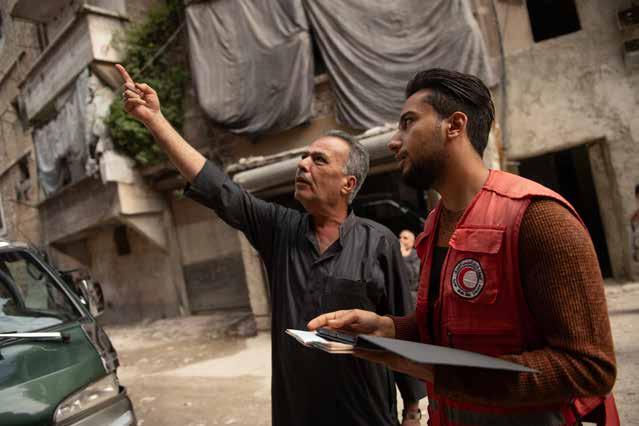
2. Strategic investment fund – £10.0 million (2023: £nil)
The trustees have decided to designate £10 million to fund the implementation of the DEC’s new five-year strategy, running from 2024-2029. This fund, over the five years, will provide the funding to invest in the DEC so it can deliver against its strategic objectives, as shown on page 27. The size of the fund has been calculated based on the underlying strategic projects that will be delivered over five years under the overall strategy. Initial assessment of budgetary requirements against each project has been made, and spend against this fund will be monitored by the Board on a regular basis.
3. Fundraising mitigation fund – £3.0 million (2023 £nil)
These funds have been set aside to mitigate the risk that over the five years the new core fundraising activity fails to deliver.
Total income included in our five-year financial forecast against this activity is £4.5 million. As there is no track record of the DEC raising funding directly for its costs, there is considerable uncertainty as to how successful this new activity will be.
4. General fund – £nil (2023: £15.6 million)
This represents surplus unrestricted reserves which will be allocated during the strategic period, either to manage short term shortfalls in funding, or will be applied to future appeals. Trustees will review this fund periodically, and any surplus funds will be returned to open appeals.
At 31 March 2024, all funds had been designated (as detailed above) or allocated to restricted appeal funds, and therefore the balance on general funds is £nil.
Through the strategic period 2024-29, the trustees expect reserves to fall back towards the reserves policy level. Any reserves the Board deem to be in excess of need will be transferred to live appeals or the DEC Emergency Fund.
Governance review
The Board has adopted the Charity Governance Code, and engages independent consultants to carry out a tri-annual review of performance against the code. The Charity Governance Code was updated in 2020 to strengthen the existing diversity and integrity principles to reflect evolving best practice. The last DEC review was carried out by Compass Partnership in 2023, who commented that: “We heard much praise for the generally high standard of governance supported by many examples of topics where the Board had added high value.” Recommendations arising from the review were discussed by the Board, with an action plan agreed to help the Board become more strategically agile. Recommendations from the review included specific improvements to trustee induction process and role descriptions, and arranging Board meeting agendas to spend more time on strategic topics. Progress will be reported to the Board periodically.
The DEC undertakes active fundraising only in the context of DEC appeals, closing at least six months ahead of the end of appeal programming to allow time for all donations to be included in planned programming.
Following the decision to launch an appeal for a crisis, we engage energetically with the public and our supporters to draw attention to the humanitarian need and raise money, using a wide range of fundraising approaches, to maximise donations to the appeal.
This includes broadcast, print and online advertising, direct marketing activities, engaging with local community and faith groups, and working with partners, businesses, trusts and foundations and philanthropists. Our fundraising activity is carried out by our core staff team, and the DEC does not employ professional telephone or street fundraisers or commercial participants.
The DEC complies with all relevant statutory regulations, including the Charities Act 2011, the Data Protection Act 2018 and the Privacy and Electronic Communications Regulations 2003. We always seek to act in ways that are legal, open, honest, and respectful – striving for best practice in fundraising by complying with a range of codes of practice, including being registered with the Fundraising Regulator, and adhering to its Code of Fundraising Practice and Fundraising Promise. We have a donations acceptance policy, which was freshly reviewed within the year by the Board of Trustees, that assesses ethical and reputational concerns, particularly for contributions from the private sector. We are careful to monitor our fundraising activities and provide supporters with help and information via our website, as well as via email, phone and post.
The DEC is committed to fundraising in an honest and responsible way. We take care to ensure we act appropriately with people who may be in vulnerable circumstances.
The DEC’s Vulnerable Persons Policy outlines how we seek to protect supporters who may be in vulnerable circumstances, detailing how we can identify potential vulnerability and what action we will take.
We have a complaints policy available on our website and we record and respond to complaints received.
In the 2023-24 financial year, the DEC received 3,673 email queries from the public, including 65 complaints, which are reported to the Executive Team and trustees. This is a reduction from the previous year due to launching no new appeals. Feedback shows that 88.7 per cent of those who contacted us were satisfied with our response and follow-up.
The Board of Trustees are directors of the company and, as shown on page 58, comprise six independent trustees (including the Chair of Trustees, Vice Chair and Honorary Treasurer) alongside the chief executives of each of the DEC’s member charities. Trustees have no financial beneficial interest in the charity but do have voting rights. Trustees receive no remuneration or any other emoluments from the DEC. Biographies of trustees are shown on the DEC’s website.
The Board meets three times each year as well as on an ad hoc basis to discuss urgent matters relating to DEC appeals. During 2023/24 the Board held a number of additional meetings focussed on the development of the new 2024 - 2029 strategy. The Board has established committees – Membership and Accountability (MAC); Audit, Finance and Risk (AFR); Remuneration (RemCom); and Donations Acceptance (DAC) – that operate under agreed terms of reference and report back to the full Board.
These committees are chaired by independent trustees and also include member trustees, as shown on page 58.
Independent trustees, including the Chair and Honorary Treasurer, hold office for a term of three years. They may then be reappointed for a second term, with provision to extend this second term by up to 12 months, and then retire from office. Member trustees hold office for a term that is related to their roles as chief executive of a DEC member charity.
The appointment of new independent trustees is overseen by the Board with support from the Membership and Accountability Committee, following an analysis of skills, targeted advertising, and an interview process, with diversity and inclusion being taken into account throughout the process. The Chair is nominated by the independent trustees and appointed by majority agreement of the member trustees.
Sue Inglish is due to end her second and final term as Chair of Trustees in March 2025. An open recruitment process is being held during 2024 to identify the
Trustee induction and conduct
Trustees sign a Declaration of Interests, Conflicts, Related Party Transactions and continuing compliance with the Fit and Proper Test form that is reviewed annually. New trustees are given a detailed induction by the Chair of Trustees, the DEC’s Chief Executive and senior staff. A trustee handbook is also provided to new trustees, including relevant policies, procedures, governance information and role descriptions. This is revisited after one year to support each trustee’s ongoing learning and development with
The Remuneration Committee is responsible for reviewing DEC Secretariat remuneration policy and practice on an annual basis for recommendation to the full Board. The Committee specifically sets the remuneration of the Chief Executive and salary ranges for the Executive Team. The DEC’s reward policy provides for an annual cost of living increase with reference to inflation and sector standards, with a pay benchmarking exercise carried out every three years to ensure that remuneration levels remain competitive in line with
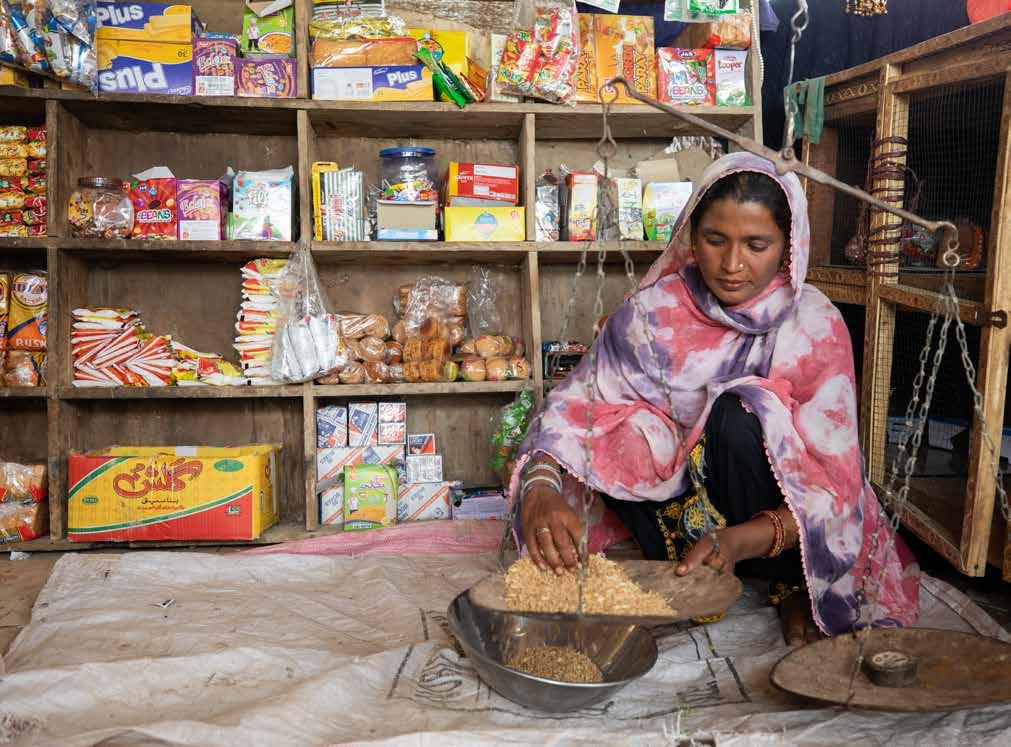
The DEC has a robust framework for identifying, reporting and managing risks and is accountable for the effective use of the charitable funds raised in its name. The DEC is not operational in aid delivery, and therefore delegates the management of risks associated with delivering humanitarian programmes to its member charities while maintaining
The risk that a DEC appeal is unsuccessful, or is seen as such, raising a low level of funds. This risk is perhaps greatest in relation to humanitarian crises that arise from conflict or are slow in their onset.
The risk that programmes funded by the DEC and managed by member charities fail to deliver the planned benefits to disaster-affected communities, whether due to poor quality or financial losses, including risks of fraud, diversion of funds or safeguarding breaches.
The risk that IT failures or a security breach results in unauthorised access to stored data and a loss of confidence in the DEC or damage to the charity’s reputation.
The risk that strongly negative media or publicity, whether direct or indirect, causes damage to the DEC’s position with the public, donors or other stakeholders.
The risk of losing ground to a new digital competitor or to changes in news media and public viewing habits towards the DEC’s traditional broadcast appeal.
The risk that domestic or international news will adversely affect the public’s willingness and ability to donate to overseas crises at the point of appeal launch.
The risk that the DEC suffers business interruption resulting in a failure to deliver against its appeal responsibility, due to either a failure of infrastructure or a staffing disruption.
oversight through an assurance system that includes independent reviews and evaluations, regular member reporting and external verification against the Core Humanitarian Standard.
The DEC has adopted an approach that assesses the charity’s risk appetite in specific areas and maintains a risk register
which is regularly reviewed in relation to those risks associated with our responsibilities for fundraising, stewardship and oversight, including what controls and safeguards operate to manage or mitigate against key financial risks. The DEC holds reserves to mitigate against key risks as detailed in the Reserves review on page 29.
The DEC monitors the onset of crises as they develop, assesses evidence of public interest and empathy and obtains feedback from broadcasters and other third parties before making an appeal in order to maximise the chance of success.
The DEC ensures its members have effective processes to manage complex risks, including in relation to any partner organisations with which they are working. The DEC also has an established framework of accountability and due diligence to ensure member charities have in place effective systems, processes and controls. Part of this framework is a serious incident reporting protocol to ensure all relevant incidents are promptly reported. Due to the nature of the work that the DEC funds, there is always the risk of a serious incident occurring. The Board has appointed a lead trustee for safeguarding matters and has held meetings for DEC member trustee leads to discuss and share safeguarding best practice.
In managing this risk, the DEC works closely with fundraising partners and suppliers. The DEC has information security policies in place, carries out regular staff training, has ongoing monitoring in this area and regularly updates security measures supported by external suppliers.
The DEC works with members to ensure the highest levels of transparency and to deliver accountability to donors, building on its work on accountability to affected populations. The DEC invests in raising public trust by reporting back on how appeal funds are spent. We require our members to adopt and adhere to the DEC accountability framework across all areas of activity.
The DEC continues to invest in development and innovation in fundraising, marketing and communications across digital media. The DEC partners and works with major digital platforms, including social media and search engines, to engage with digital influencers and to work with public broadcasters to increase their digital offering.
The DEC monitors domestic and international trends to ensure that it can adapt and respond rapidly to change.
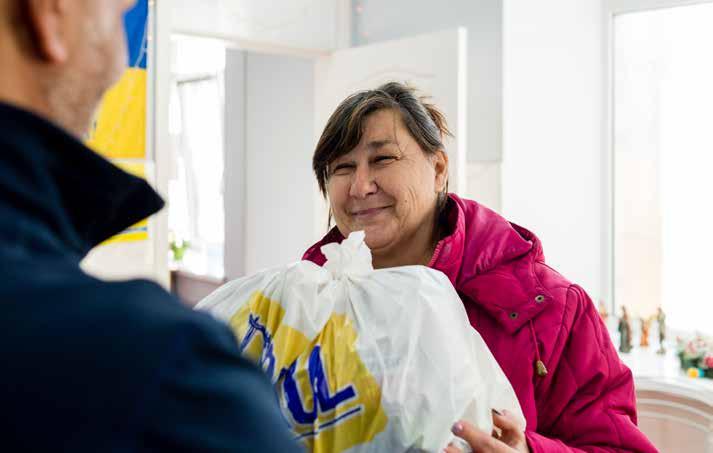
The Trustees consider that there are no material uncertainties about the charitable company’s ability to continue as a going concern.
In making this judgement, the trustees considered current financial performance, free reserve levels, future cash flow forecasts (one year from account signing date) and the 2024/25 budget.
Under its memorandum and articles of association, the charity has the power to make investments. The DEC needs to be in a position to enable its members to act very quickly in emergencies and therefore has a policy to balance keeping a proportion of funds in instant access and short-term deposits that can be accessed readily with considerations of high security and investment return.
the trustees consider the relevant actions of the Board, and engagement with all stakeholders is described throughout the annual review. Taking the areas required for disclosure in turn:
• The likely consequences of any decision in the long term
Organisational decisions are made by the trustees with reference to the charity’s five-year strategic plan, which is summarised on page 26 of this report. This strategic plan was developed with key stakeholders of the DEC, including member charities, broadcasters, and DEC staff.
Risk management processes are set out on page 32 of this report, and the charity’s reserve policy is also detailed on page 29.
The Board includes representatives of each of the 15 DEC member charities, who ensure that decisions made are in the best interests of the DEC in the long term.
• Engagement with recipients
verified or independently certified. As part of this process, members are required to ensure that communities and people affected by crises receive assistance appropriate and relevant to their needs. In order to achieve this, members are required to engage appropriately with recipients. Members communicate, consult and provide for the participation of interested and affected stakeholders, ensuring that their concerns, desires, expectations, needs, rights and opportunities are considered in the establishment, implementation and review of the programmes assisting them.
• The interests of the company’s employees
The DEC monitors and improves all critical systems, ensuring contingencies are in place. All key staff have cover plans in place, with deputies for CEO and all directors appointed. Regular wellbeing reviews monitor the mental health of staff, particularly during heightened activity of an appeal.
The trustees, who are Directors for the purposes of the Companies Act, confirm that in accordance with Section 172 (1) of the Companies Act they act in a way they consider most likely to achieve the purposes
The DEC Board has made external verification/certification against the Core Humanitarian Standard (CHS) on Quality and Accountability a membership requirement.
All DEC members have been independently
The DEC had a staff of 36 employees as of 31 March 2024 (2023: 37 employees). The oversight of remuneration is undertaken by the Remuneration Committee, a subcommittee of the Board of Trustees. The charity has employed an HR Manager to provide in-house HR support for the team. Additional staff benefits include discounts for health, wellbeing, personal and financial essentials. We advocate being a flexible and inclusive employer and (currently) expect staff to be in the office two days per month.
The DEC carries out regular staff surveys to monitor, amongst other factors, staff wellbeing and assess the effectiveness of hybrid working.
The charity is engaged in an Equality, Diversity and Inclusion (EDI) programme, which has included externally facilitated workshops with staff, and the development of a work plan to further cement EDI principles within the DEC, as part of the overall HR strategic plan. This work is being overseen by the Board and supported by the internal HR Manager post.
• The need to foster the company’s business relationships with suppliers, customers and others
The DEC is keen to maintain a positive relationship with its suppliers, ensuring all non-disputed invoices are paid within agreed payment terms. The relationship with our suppliers is key for the DEC, as during appeals we often require our suppliers to turn around services very quickly in order for us to achieve appeal deadlines. DEC staff invest time to meet suppliers outside of appeal to build relationships and seek better ways of working. Any supplier complaints are notified to the Director of Finance and Resources.
The DEC’s relationship with its supporters is outlined on page 30 of this report.
• The impact of the company’s operations on the community and environment
The DEC has offices by Regents Canal, London, between Angel and Old Street. We are looking at ways we can engage positively with the local community. With regards to our impact on the environment, we are looking at ways in which we can move to be carbon zero in the coming years.
We expect to make a limited number of visits to countries where DEC members are responding as part of an appeal over the coming year. We generally cooperate with international colleagues and partners via virtual meetings as opposed to international travel, but acknowledge the value of field visits in relation to both checking on the work being funded by the DEC and the reporting back of progress to donors.
We have engaged local content gathering visits (journalists, photographers) in order to both gain access to remote areas, and to minimise cost and impact of travel. All our
furniture, fittings, equipment, and carpet tiles in our office have been transferred from our previous office, thereby reducing waste and cost. We have recycling bins in our office, auto-sensors on lights and centrally controlled air-cooling systems.
As the DEC is deemed a large company under the Companies Act criteria, it therefore falls under the reporting requirements of the Streamlined Energy and Carbon Reporting (SECR) legislation. However, as the DEC did not consume more than 40,000 kWh of energy during the financial year, it qualifies as a low energy user and is exempt from reporting under these regulations.
DEC members are asked at each reporting milestone what measures they are taking to reduce the environmental impact of their work and strengthen affected communities’ resilience to climate change. Over the course of the new strategic period, the DEC will include the Climate and Environment Charter as a membership requirement. This will involve member charities being periodically assessed against the charters’ commitments.
• The desirability of the company maintaining a reputation for high standards of business conduct
The DEC has a policy structure to ensure the management of regulatory and legal risk and is committed to complying with all applicable laws and regulations relating to fraud, bribery, and corruption.
• The need to act fairly between members of the company
The trustees understand the Charity Commission requirements and understand the need to avoid and manage potential conflicts of interest.
Statement of Trustees’ responsibilities
The trustees (who are also the directors of the DEC for the purposes of company law) are responsible for preparing the trustees’ report, including the strategic report and the financial statements in accordance with applicable law and UK Accounting Standards (UK Generally Accepted Accounting Practice).
Company law requires the trustees to prepare financial statements for each financial year which give a true and fair view of the state of affairs of the charitable company and of its incoming resources and application of resources, including the income and expenditure, for that period.
In preparing these financial statements, the trustees are required to:
1. select suitable accounting policies and then apply them consistently
2. observe the methods and principles in the Charities SORP
3. make judgements and estimates that are reasonable and prudent
4. state whether applicable UK Accounting Standards and Statements of Recommended Practice have been followed, subject to any material departures disclosed and explained in the financial statements
5. prepare the financial statements on the going concern basis unless it is inappropriate to presume that the charity will continue in operation.
The trustees are responsible for ensuring that adequate accounting records are kept that disclose with reasonable accuracy at any time the financial position of the charitable company and enable them to ensure that the financial statements comply with the Companies Act 2006. They are also responsible for safeguarding the assets of the charitable company and hence for taking reasonable steps for the prevention and detection of fraud and other irregularities.
The trustees are responsible for the maintenance and integrity of the corporate and financial information included on the charitable company’s website. Legislation in the UK governing the preparation and dissemination of financial statements may differ from legislation in other jurisdictions. The strategic report includes a review of financial performance and of the charity’s reserves position. We have adequate financial resources and are well placed to manage the business risks. Our planning process, including financial projections, has taken into consideration
the current economic climate and its potential impact on the various sources of income and planned expenditure. We have a reasonable expectation that we have adequate resources to continue in operational existence for the foreseeable future. We believe that there are no material uncertainties that call into doubt the charity’s ability to continue. The accounts have therefore been prepared on the basis that the charity is a going concern.
Insofar as each of the trustees of the charitable company at the date of the approval of this report is aware:
● there is no relevant audit information (information needed by the company’s auditor in connection with preparing the audit report) of which the company’s auditor is unaware
● each trustee has taken all steps that they should have taken as a trustee in order to make themselves aware of any relevant audit information and to establish that the company’s auditor is aware of that information.
Meeting and reporting on public benefit
The trustees confirm that they have complied with the duty in section 4 of the Charities Act 2011 to have due regard to the Charity Commission’s general guidance on public benefit, ‘Charities and Public Benefit.’
The structure of the trustees’ annual report includes reporting on our strategic aims, the DEC’s activities and achievements during the year and our plans going forward.
We have highlighted how our work furthers our charitable purpose and the significant benefits it brings to:
1. people in developing countries in urgent need of emergency relief, regardless of race, creed or nationality, through the funding provided by DEC appeals to 15 of the UK’s leading humanitarian charities;
2. the promotion of the efficiency and effectiveness of life-saving assistance and the alleviation of poverty;
3. people in developing countries affected by an emergency situation being involved in the relief effort and being treated with dignity.
This trustees’ report, including the strategic report, was approved by the Board of Trustees on 14 August 2024 and signed on its behalf by Sue Inglish
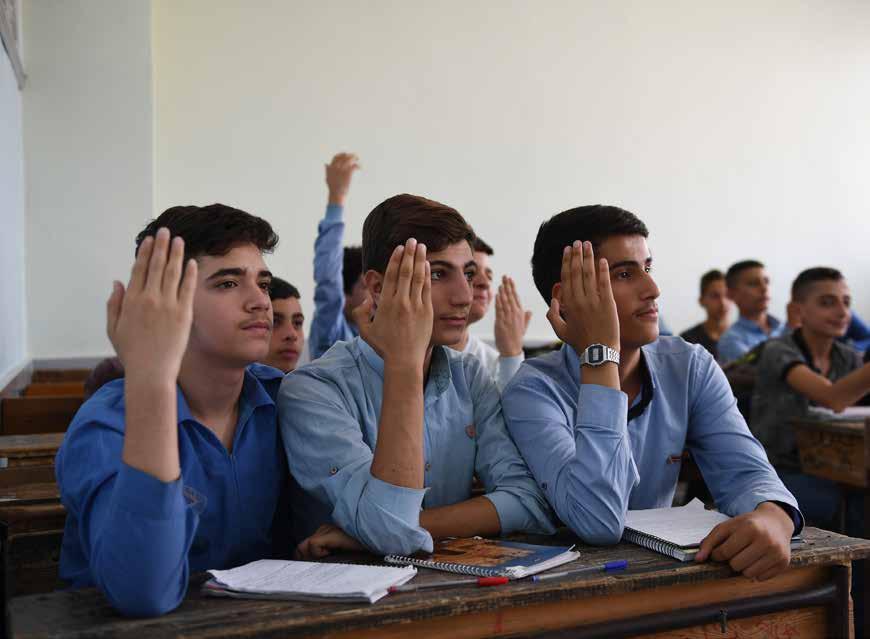
We have audited the financial statements of the Disasters Emergency Committee for the year ended 31 March 2024 which comprise the Statement of Financial Activities, Balance Sheet, Statement of Cash Flows and notes to the financial statements, including significant accounting policies. The financial reporting framework that has been applied in their preparation is applicable law and United Kingdom Accounting Standards, including Financial Reporting Standard 102 The Financial Reporting Standard applicable in the UK and Republic of Ireland (United Kingdom Generally Accepted Accounting Practice).
In our opinion, the financial statements:
• give a true and fair view of the state of the charitable company’s affairs as at 31 March 2024 and of the incoming resources and application of resources, including its income and expenditure for the year then ended;
• have been properly prepared in accordance with United Kingdom Generally Accepted Accounting Practice; and
• have been prepared in accordance with the requirements of the Companies Act 2006
We conducted our audit in accordance with International Standards on Auditing (UK) (ISAs (UK)) and applicable law. Our responsibilities under those standards are further described in the Auditor’s responsibilities for the audit of the financial statements section of our report. We are independent of the charitable company in accordance with the ethical requirements that are relevant to our audit of the financial statements in the UK, including the FRC’s Ethical Standard, and we have fulfilled our other ethical responsibilities in accordance with these requirements. We believe that the audit evidence we have obtained is sufficient and appropriate to provide a basis for our opinion.
In auditing the financial statements, we have concluded that the trustee’s use of the going concern basis of accounting in the preparation of the financial statements is appropriate.
Based on the work we have performed, we have not identified any material uncertainties relating to events or conditions that, individually or collectively, may cast significant doubt on the charitable company’s ability to continue as a going concern for a period of at least twelve months from when the financial statements are authorised for issue.
Our responsibilities and the responsibilities of the trustees with respect to going concern are described in the relevant sections of this report.
The trustees are responsible for the other information contained within the annual report. The other information comprises the information included in the annual report, other than the financial statements and our auditor’s report thereon. Our opinion on the financial statements does not cover the other information and, except to the extent otherwise explicitly stated in our report, we do not express any form of assurance conclusion thereon.
Our responsibility is to read the other information and, in doing so, consider whether the other information is materially inconsistent with the financial statements or our knowledge obtained in the audit or otherwise appears to be materially misstated. If we identify such material inconsistencies or apparent material misstatements, we are required to determine whether this gives rise to a material misstatement in the financial statements themselves. If, based on the work we have performed, we conclude that there is a material misstatement of this other information, we are required to report that fact.
We have nothing to report in this regard.
In our opinion, based on the work undertaken in the course of the audit:
• the information given in the trustees’ report, which includes the directors’ report and the strategic report prepared for the purposes of company law, for the financial year for which the financial statements are prepared is consistent with the financial statements; and
• the strategic report and the directors’ report included within the trustees’ report have been prepared in accordance with applicable legal requirements.
In light of the knowledge and understanding of the charitable company and their environment obtained in the course of the audit, we have not identified material misstatements in the strategic report or the directors’ report included within the trustees’ report.
We have nothing to report in respect of the following matters in relation to which the Companies Act 2006 requires us to report to you if, in our opinion:
• the parent company has not kept adequate accounting records; or
• the parent company financial statements are not in agreement with the accounting records and returns; or
• certain disclosures of trustees’ remuneration specified by law are not made; or
• we have not received all the information and explanations we require for our audit.
As explained more fully in the trustees’ responsibilities statement set out on page 34, the trustees (who are also the directors of the charitable company for the purposes of company law) are responsible for the
preparation of the financial statements and for being satisfied that they give a true and fair view, and for such internal control as the trustees determine is necessary to enable the preparation of financial statements that are free from material misstatement, whether due to fraud or error.
In preparing the financial statements, the trustees are responsible for assessing the charitable company’s ability to continue as a going concern, disclosing, as applicable, matters related to going concern and using the going concern basis of accounting unless the trustees either intend to liquidate the charitable company or to cease operations, or have no realistic alternative but to do so.
Our objectives are to obtain reasonable assurance about whether the financial statements as a whole are free from material misstatement, whether due to fraud or error, and to issue an auditor’s report that includes our opinion. Reasonable assurance is a high level of assurance, but is not a guarantee that an audit conducted in accordance with ISAs (UK) will always detect a material misstatement when it exists. Misstatements can arise from fraud or error and are considered material if, individually or in the aggregate, they could reasonably be expected to influence the economic decisions of users taken on the basis of these financial statements.
Details of the extent to which the audit was considered capable of detecting irregularities, including fraud and non-compliance with laws and regulations are set out below.
A further description of our responsibilities for the audit of the financial statements is located on the Financial Reporting Council’s website at: www.frc.org.uk/ auditorsresponsibilities. This description forms part of our auditor’s report.
Irregularities, including fraud, are instances of non-compliance with laws and regulations. We identified and assessed the risks of
material misstatement of the financial statements from irregularities, whether due to fraud or error, and discussed these between our audit team members. We then designed and performed audit procedures responsive to those risks, including obtaining audit evidence sufficient and appropriate to provide a basis for our opinion.
We obtained an understanding of the legal and regulatory frameworks within which the charitable company operates, focusing on those laws and regulations that have a direct effect on the determination of material amounts and disclosures in the financial statements. The laws and regulations we considered in this context were:
• Charities Act 2011
• Companies Act 2006
We assessed the required compliance with these laws and regulations as part of our audit procedures on the related financial statement items.
In addition, we considered provisions of other laws and regulations that do not have a direct effect on the financial statements but compliance with which might be necessary to the charitable company’s ability to operate or to avoid a material penalty. We also considered the opportunities and incentives that may exist within the charitable company for fraud. The laws and regulations we considered in this context for the UK operations were:
• Charity Commission regulations
• General Data Protection Regulation (GDPR)
• Anti-fraud, bribery and corruption legislation
• Environmental protection legislation
• Health and safety legislation
• Employment legislation
Auditing standards limit the required audit procedures to identify non-compliance with these laws and regulations to enquiry of the Trustees and other management and inspection of regulatory and legal correspondence, if any.
We identified the greatest risk of material impact on the financial statements from irregularities, including fraud, to be within the timing of recognition of income and override of controls by management. Our audit procedures to respond to these risks included enquiries of management, and the Audit & Risk Committee about their own identification and assessment of the risks of irregularities, sample testing on
the posting of journals, reviewing accounting estimates for biases, reviewing regulatory correspondence with the Charity Commission and reading minutes of meetings of those charged with governance.
Owing to the inherent limitations of an audit, there is an unavoidable risk that we may not have detected some material misstatements in the financial statements, even though we have properly planned and performed our audit in accordance with auditing standards. For example, the further removed noncompliance with laws and regulations (irregularities) is from the events and transactions reflected in the financial statements, the less likely the inherently limited procedures required by auditing standards would identify it. In addition, as with any audit, there remained a higher risk of non-detection of irregularities, as these may involve collusion, forgery, intentional omissions, misrepresentations, or the override of internal controls. We are not responsible for preventing non-compliance and cannot be expected to detect non-compliance with all laws and regulations.
This report is made solely to the charitable company’s members, as a body, in accordance with Chapter 3 of Part 16 of the Companies Act 2006. Our audit work has been undertaken so that we might state to the charitable company’s members those matters we are required to state to them in an auditor’s report and for no other purpose. To the fullest extent permitted by law, we do not accept or assume responsibility to anyone other than the charitable company and the charitable company’s members as a body, for our audit work, for this report, or for the opinions we have formed.
Naziar Hashemi Senior Statutory Auditor For and on behalf of Crowe U.K. LLP London, UK
Balance Sheet at 31 March 2024
DEC
Humanitarian Emergency Fund (Scotland)
Humanitarian Emergency Fund (Wales)
Coronavirus response programmes
Humanitarian Emergency Fund (Scotland)
Humanitarian Emergency Fund (Wales) Lesson
The cash at bank and in hand balance mostly represents funds raised during appeals, the disbursement of these funds which takes place over the period of the programmes in question. More details are disclosed in note 10 to the
Inglish Melanie Hind Chair Honorary Treasurer
a)
The financial statements have been prepared in accordance with Accounting and Reporting by Charities: Statement of Recommended Practice applicable to charities preparing their accounts in accordance with the Financial Reporting Standard applicable in the UK and Republic of Ireland (FRS 102) - (Charities SORP FRS 102), the Financial Reporting Standard applicable in the UK and Republic of Ireland (FRS 102) and the Companies Act 2006.
Assets and liabilities are initially recognised at historical cost or transaction value unless otherwise stated in the relevant accounting policy or note.
b) Public benefit entity
The charitable company meets the definition of a public benefit entity under FRS 102.
c) Going concern
The trustees consider that there are no material uncertainties about the charitable company’s ability to continue as a going concern. In making this judgement, the trustees considered current financial performance, free reserve levels, future cashflow forecasts (one year from account signing date) and the 2024/25 budget.
The financial statements include the following estimates:
1. Gift Aid. At the time of signing, the financial statements include Gift Aid accrued income of £0.7 million which includes an estimate for claims not yet processed by the DEC. The basis of the estimate is historic recovery on previous appeals.
2. Legacy recognition. The DEC’s policy on recognition of legacy income is detailed in note 1 e).
3. Allocation to members. The DEC’s policy on allocating appeal funds to members is detailed in note 1 i).
4. Investment income. The DEC’s policy on restriction of investment income is to follow to restriction of the original donation, estimates are included where exact figures are not available.
Other than the areas of estimation detailed above, the trustees do not consider that there are any other sources of estimation uncertainty at the reporting date that have a significant risk of causing a material adjustment to the carrying amounts of assets and liabilities within the next reporting period.
e) Income
Income is recognised when the charity has entitlement to the funds, it is probable that the income will be received and that the amount can be measured reliably. Income includes associated Gift Aid tax reclaims.
Donations to DEC appeals are included as restricted income, used to fund the related disaster response programmes. Associated Gift Aid tax reclaims are included as unrestricted income and then transferred to the related restricted fund for each DEC appeal. Contributions from member charities towards DEC’s appeal preparedness is included as donations and accounted for when received.
Income from legacies is included when received from the estate or when the charity is notified by the executor that a distribution will be made. DEC policy in financial year 2023/24 was to allocate 50% of legacy income to restricted income used to fund disaster response programmes and 50% was allocated to unrestricted income, unless the will directs otherwise. From 1st April 2024, DEC policy was updated to allocate legacy income to unrestricted income, unless the will directs otherwise.
Interest on funds held on cash deposit is included when receivable.
f)
During the year the DEC has benefited from legal, broadcasting, promotion and donations processing services received free or at discounted rates from various
providers. Where the value of the services is quantifiable the value has been attributed to these services in the accounts.
The majority of services provided are not reasonably quantifiable and measurable and the cost of identifying them and assessing their value to the DEC would outweigh the benefit to users of the accounts. Therefore these donated services have been omitted.
In accordance with the Charities SORP (FRS 102), volunteer time is not recognised. The trustees’ annual report provides more information about their contribution.
g) Fund accounting
Restricted funds are used for specific purposes as laid down by the donor or related to a specific DEC appeal. Expenditure which meets these criteria is charged to the fund.
Unrestricted funds are donations and other incoming resources received or generated for the charitable purposes.
Designated funds are unrestricted funds earmarked by the trustees for particular purposes.
h) Expenditure and irrecoverable VAT
Expenditure is recognised once there is a legal or constructive obligation to make a payment to a third party, it is probable that settlement will be required and the amount of the obligation can be measured reliably. Expenditure is classified under the following activity headings:
Costs of raising funds relate to the costs incurred by the charity in encouraging individuals and other third parties to make voluntary contributions to DEC appeals, as well as the cost of any activities with a fundraising purpose.
Expenditure on charitable activities includes the funds allocated to DEC member charities towards the costs of delivering disaster response programmes as set out in note i) below. Expenditure is recognised
when allocations are confirmed to members because it is at this time that a firm commitment is made by DEC towards the planned programmes of work by members in response to each appeal.
Irrecoverable VAT is charged as a cost against the activity for which the expenditure was incurred.
i) Basis of allocation to member charities
Member charities receive a share of the appeal income if they opt into that appeal.
A formula known as the Indicator of Capacity (IOC) is used to allocate appeal funds among DEC member charities.
DEC informs the member charities of their estimated income from an appeal after one week and commits funds towards disaster relief programmes two weeks after the appeal launch. Further allocations are made as income for specific appeals is received and as the programme is implemented. On Board approval, funds may be allocated outside of the IOC formula where required.
j)
All expenditure is accounted for on an accruals basis and has been classified under headings that aggregate all costs related to that category. Where costs cannot be directly attributed to particular headings they have been allocated to activities on a basis consistent with use of resources.
Fundraising expenditure has been shown separately. These costs are incurred in seeking donations and voluntary contributions and do not include the costs of disseminating information in support of the charitable activities.
Governance costs are the costs associated with the governance arrangements of the charity which relate to the general running of the charity as opposed to those costs associated with fundraising or charitable activity. Included within this category are costs associated with the strategic as opposed to day-to-day management of the charity’s activities.
Support costs, which include costs associated with general management, financial management and accounting, information technology, human resources and premises, are allocated across the categories of charitable expenditure, governance costs and the costs of generating funds. Support costs and other core costs are recharged to the restricted fund and will fluctuate annually based on appeal activity during the year. The basis of the cost allocation has been explained in the notes to the accounts.
k) Operating leases
Rental charges are charged on a straight line basis over the term of the lease.
l) Tangible and intangible assets
Tangible fixed assets are stated at cost less accumulated depreciation. Assets,
or groups of assets purchased within a single project, costing £1,000 and above are capitalised. Depreciation is provided at rates calculated to write down the cost of each asset to its estimated residual value over its expected useful life. The depreciations/amortisation rates in use are as follows:
Leasehold improvements
- five years or term of lease if shorter Furniture, fittings and office equipment
- five years
Computer equipment
- three years
Website development & software
- three years
m) Cash at bank and in hand
Cash at bank and cash in hand includes cash and short term highly liquid investments with a short maturity of three months or less from the date of acquisition or opening of the deposit or similar account. Cash deposits with maturities above three months are shown as current asset investments.
n) Pension contributions
The charity has a stakeholder pension scheme and makes defined contributions based on salary. Pension contributions are charged to the statement of financial activities as incurred and attributed to unrestricted and restricted funds in line with other Secretariat staffing costs.

2. INCOME
2a) Donations and legacies
Gift Aid income relates to income from historical appeals where programmes have ended. This income is retained as unrestricted income to fund the running of the charity.
Unrestricted trust donations are to support the ongoing running costs of the DEC, as driven by the five-year strategy for 2024-2029. Restricted donations supporting appeals from trusts and foundations are included within Appeal donations (see note 2b. Charitable Activities).
2b) Charitable activities
DEC Turkey-Syria Earthquake Appeal
DEC Pakistan Floods Appeal
DEC Ukraine Humanitarian Appeal
DEC Afghanistan Crisis Appeal
DEC Emergency Fund
DEC Coronavirus Appeal
Total charitable activities
Gift Aid income represents Gift Aid recovered on donations during the year. It is DEC policy to transfer no less than 50% of Gift Aid recovered into the respective appeal funds. Details of this transfer can be found in note 14 to the accounts.
Appeal donations includes donations from the general public, trusts and foundations and corporates.
The DEC is grateful for the support of the UK Government through its UK Aid Match scheme. During the year, the DEC received no matched funds due to no appeals launched in the financial period. (2023: DEC received £5.0 million for the DEC Pakistan Floods Appeal and £5.0 million for the DEC Turkey-Syria Earthquake Appeal.)
The DEC Emergency Fund represents donations from trusts and foundations, to support future disasters. Further details of fund movements can be found in note 14 to the accounts.
(continued)
During the current financial year there was £nil other income received. During the prior year the DEC received a contribution of £25,000 towards the refit of Wenlock Road from the landlord as part of the rental agreement.
Notes to the financial statements for the year ended 31 March 2024
During the current financial year, expenditure towards Lesson learning and accountability has increased to £1,281k (2023: £606k) as a result of the increased level of monitoring and evaluation carried out across multiple appeal responses.
Allocated support costs: cost allocation includes an element of judgement and the charity has had to consider the cost and benefit of detailed calculations and record keeping. This allocation includes support costs where they are attributable and are a best estimate of the costs that have been so allocated. The various categories of support costs are described above (see note 1j).
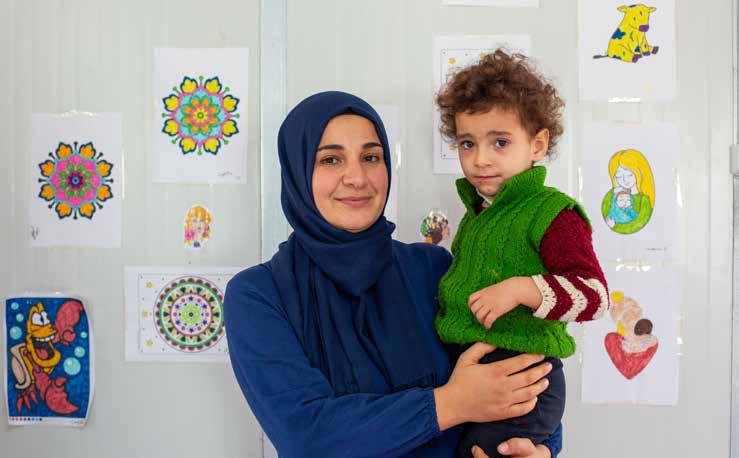
4c) Collective initiative projects
During the year the DEC committed £3,235,000 (2023: £6,612,000) of appeal funds towards collective initiative projects. Collective initiatives support and incentivise innovative, joint programming to increase the impact of DEC funds. This allows the DEC and member charities to jointly address quality and accountability gaps, explore humanitarian innovations and accelerate programming in key areas such as safeguarding, localisation, cash and accountability to affected populations, which are all membership-wide priorities.
In total, the Board agreed in the prior year a budget of £10.0 million for Ukraine Humanitarian response (UHA) and £5.0 million for Turkey-Syria Earthquake responses (TSE). The totals presented above are amounts committed to member charities and suppliers for collective initiative projects in the year to 31st March 2024. Remaining budgets are planned to be spent over the remaining programmatic periods of each appeal.
5.
No trustees received emoluments in the year (2023: nil). Amounts reimbursed to trustees for travel and other expenditure totalled £336 in the year (2023: £nil).
DEC incurred costs for trustees training in the year of £680 (2023: £2,300) and trustees travel overseas for one trustee to visit programmes within DEC Turkey-Syria Earthquake Appeal of £749 (2023: £3,099).
The highest paid employee is the Chief Executive, whose emoluments in the year include a salary of £99,666 (2023: £99,521). Salary includes Time off in Lieu payment of £nil (2023: £8,800). In addition the CEO received pension contributions including contributions by way of employee salary exchange of £35,018 (2023: £34,738) and benefited from a healthcare cash plan for annual cost incurred by the employer for £156 (2023: £156) and no other benefits in kind or other remuneration are paid.
The contribution of £35,018 by the Chief Executive to the defined contribution pension scheme (as noted above) is made up of an eight per cent employer pension contribution and eighteen per cent employee pension contribution (by way of salary exchange).
The total amount of remuneration and benefits paid to the key management personnel were £553,609 (2023: £496,790).
c) The
(head
12. OPERATING LEASE COMMITMENTS
The balance in cash and short term deposits represents funds raised during the Turkey-Syria Earthquake Appeal, Pakistan Floods Appeal and Ukraine Humanitarian Appeal. While these funds have very largely been committed to member charities towards disaster response programmes, the disbursement of these fund take place over the period of those programmes.
The DEC entered into a
13. ANALYSIS OF NET ASSETS BETWEEN FUNDS

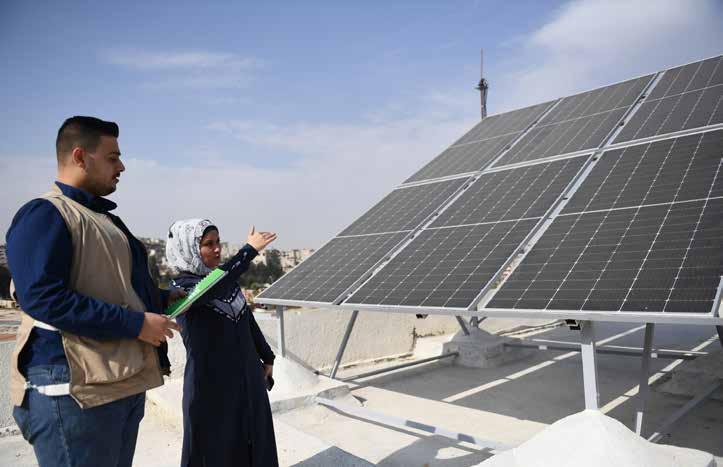
Restricted income funds All restricted income fund balances at year end are represented by cash balances, debtors and creditors. Restricted income funds All restricted income fund balances at year end are represented by cash balances, debtors and creditors.
The DEC Turkey-Syria Appeal was launched on 9th February 2023 and raised £15.0 million in this financial year. Of the £15.0 million raised, £8.2 million was from appeal donations, £4.2 million was from Gift Aid, £2.3 million was from investment income and £191k was from donations and legacies. Net income of £13.3 million (represented by £10.8 million income & £2.5 million transfers) represent total appeal income less DEC core cost recovery and other adjustments. £23.2 million was committed to member agencies in the year towards disaster response programmes. Total DEC income raised since launch is £113.9 million.
The DEC Pakistan Floods Appeal was launched on 1st September 2023 and raised £2.1million in this financial year. Of the £2.1million raised, £828k was from appeal donations, £601k was from Gift Aid, £641k was from investment income and £46k was from donations and legacies. Net income of £2.9 million (represented by £1.5 million income & £1.4 million transfers) represent total appeal income, DEC core cost recovery and other adjustments. £7.5 million was committed to member agencies in the year towards disaster response programmes. Total DEC income raised since launch is £38.2 million.
The DEC Ukraine Humanitarian Appeal was launched on 3 March 2022 and raised £11.4 million in this financial year. Of the £11.4 million raised, £6.4 million was from appeal donations, £1.5 million was from Gift Aid, £3.3 million was from investment income and £61k was from donations and legacies. Net income of £13.4 million (represented by £9.9 million income & £3.5 million transfers) represent total appeal income less DEC core cost recovery and other adjustments. £11.0 million was committed to member agencies in the year, from funds raised in the current and last financial year, towards disaster response programmes. Total DEC income raised since launch is £307.1 million.
The DEC Afghanistan Crisis Appeal was launched on 15 December 2021 and raised £0.3 million in this financial year. Of the £0.3 million raised, 276k was from Gift Aid, £52k was from investment income and £3k was from appeal donations. £1.9 million was committed to member agencies in the year, from funds raised in the current and prior financial years, towards disaster response programmes. Total DEC income raised since launch is £39.9 million.
Since March 2018 the DEC has had a fund that donors can give to outside of our high-profile appeals. Donations to our Emergency Fund are allocated to the next DEC appeal launched to respond to a crisis overseas, whether it’s a natural disaster, disease outbreak or a crisis fuelled by drought or conflict.
The DEC Emergency Fund helps us respond quickly and effectively when a crisis hits. Having funds in reserve allows us to get more money where it is needed as quickly as possible to save, protect and rebuild lives by working with the communities affected. The immediate response to any major disaster on this scale is likely to include provision of food, clean water, medicine and shelterand we provide a full account of how money from the Emergency Fund has been spent as part of our overall appeal funds in our programme reports. Alongside funds donated directly to the Emergency Fund, any surplus unrestricted funds in year, or donations received for closed appeals, are transferred into this fund.
Restricted designated funds Restricted designated funds reflect appeal funds relating to the Turkey-Syria Earthquake Appeal and the Ukraine Humanitarian Appeal which have been designated to collective initiatives. Collective initiatives support and incentivise innovative, joint programming to increase the impact of DEC funds. This allows the DEC and members to jointly address quality and accountability gaps, explore humanitarian innovations and accelerate programming in key areas such as safeguarding, localisation, cash and accountability to affected populations, which are all membership-wide priorities. These funds are either transferred directly to third parties, or passed through a member charity.
The Board agreed in the prior year a budget of £10.0 million for Ukraine Humanitarian response & £5.0 million for Turkey-Syria Earthquake responses. £2.8 million (2023: £nil) was committed to member charities and suppliers for Turkey-Syria Earthquake responses and £0.4 million (2023: £6.6 million) for Ukraine Humanitarian response.
General reserve transfers UUnrestricted income includes £7.4 million of Gift aid income. For appeals launched during the prior year, 50% of the unrestricted Gift Aid income was allocated to appeals and 50% retained to cover DEC costs. This is shown as a transfer between funds of £2,143k to the DEC Turkey-Syria Earthquake Appeal, £601k to the DEC Pakistan Floods Appeal, £756k to the DEC Ukraine Humanitarian Appeal, and £276k to the DEC Afghanistan Crisis Appeal.
£13.0 million was transferred from the general reserve to designated reserves (see below), and a further £1.0 million was transferred from the general reserve to operational reserves to increase to £5.0 million.
At 31 March 2024, all funds had been designated (as detailed below) or allocated to restricted appeal funds, and therefore the balance on general funds is £nil.
Designated funds The trustees have decided to set aside £10.0 million fund the implementation of the DEC’s new 5-year strategy, running from 2024-2029. This fund, over the 5-year strategic period, will provide the funding to invest in the DEC to deliver against its strategic objectives. An additional £3.0 million has been set aside to mitigate the risk over the strategic period that the new core
fundraising activity fails to deliver. The total income included in our five-year financial forecast against this activity is £4.5 million. The DEC sees this as high-risk activity given that it has no track record in raising funding for DEC costs.
Gift Aid tax recoverable on donations to the DEC appeals, although unrestricted, is designated to the relief work respectively in those crisis-affected countries for which DEC appeals are launched. Income accrued for Gift Aid for these appeals has already been transferred from the designated fund to the restricted fund for the DEC Turkey-Syria Earthquake Appeal, DEC Pakistan Floods Appeal, DEC Ukraine Humanitarian Appeal and DEC Afghanistan Appeal, as there is a presumption that this money will be utilised against these appeal responses.
(expenditure) for the reporting period (20,782) (46,732) (as per the Statement of Financial Activities)
of older people in Syria affected by the earthquakes.
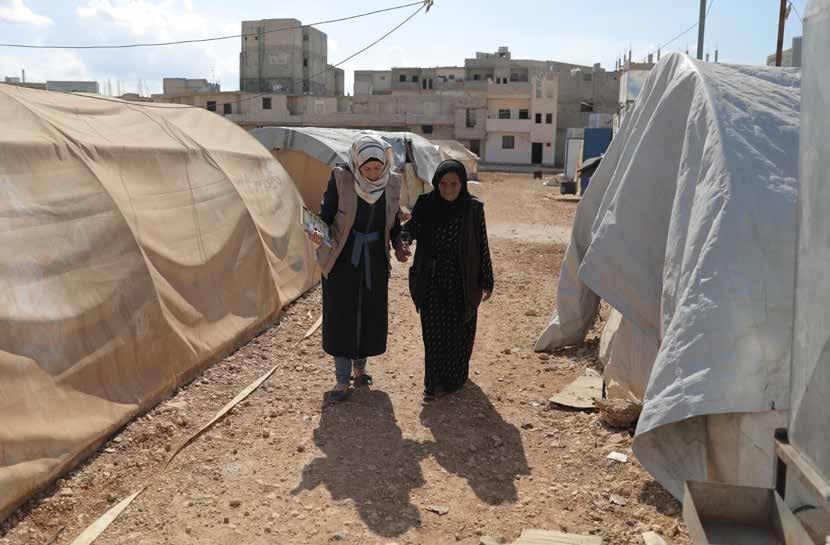
16. STATEMENT OF FINANCIAL ACTIVITIES (INCORPORATING AN INCOME AND EXPENDITURE ACCOUNT)
For the year ended 31 March 2023
The charity trustees disclosed on page 58 include executives of all member charities. The material transactions are disclosed in note 4. The member charities made donations of £1 million (2023: £1 million) in the year to the charity. In addition, £19k (2023: £1,530k) was collected in the year by member charities on behalf of the charity. Being £1k (2023: £180k) Turkey-Syria Earthquake Appeal, £10k (2023: £217k) Pakistan Floods Appeal, £7.5k (2023: £1,132k) Ukraine Humanitarian Appeal and £500 (2023: £483) Afghanistan Crisis Appeal.
During the year DEC made payment of £1,592k (2023: £2,158k) to Social Development Direct (“SDD”), a consultancy acquired by Plan International UK (a DEC member) in 2020 as a social impact investment. All of SDD’s profits are donated to Plan International UK. Rose Caldwell, CEO of Plan International UK and trustee of the DEC, is a director of SDD. Note that during the year, £1,592k (2023: £958k) was paid to SSD for the collective initiatives projects and £nil (2023: £1,200k) was paid to SDD from the allocation to members, with an outstanding creditor at year-end of £nil (2023: £1,342k).
The Humanitarian Memorial Appeal (HMA) is an initiative to establish a lasting memorial to humanitarian workers, including those killed or injured in the course of helping others. HMA is an unconstituted body run by a steering group comprising 11 individuals, including DEC’s CEO, Saleh Saeed. DEC is supporting HMA with the provision of a bank account, and during the financial year the bank balance stood at £303k (2023: £308k). Under the terms of the agreement with HMA, DEC has no responsibility for the management and control of HMA. The activities of HMA are not reflected in these accounts.
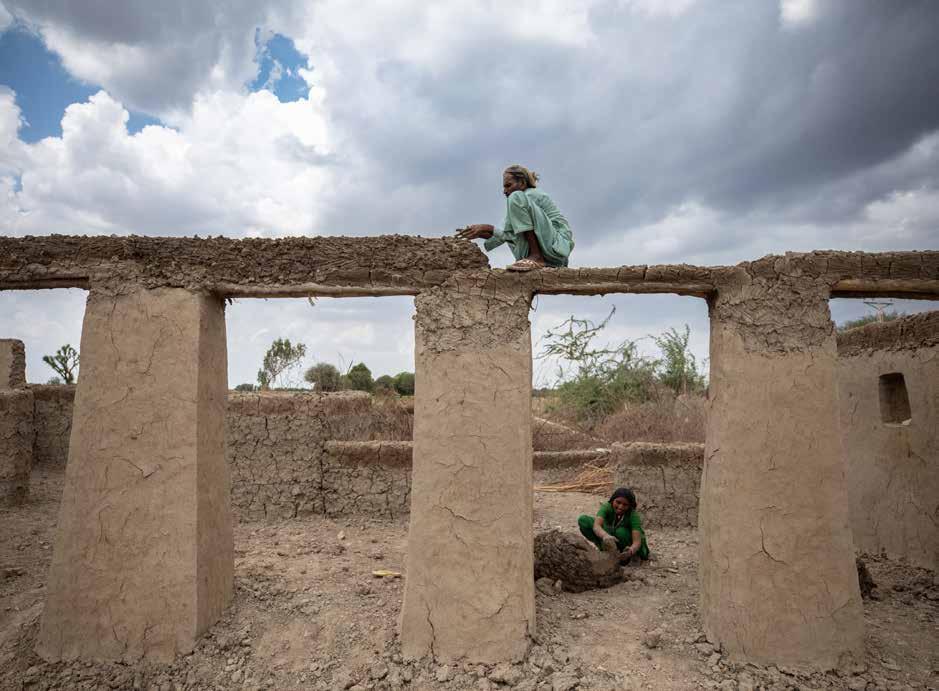
ROLES OF THE BOARD COMMITTEES
Membership and Accountability Committee
Responsible for developing accountability policy and monitoring member charities and DEC performance against it, and overseeing DEC activity to promote learning and accountability. The committee is also responsible for ensuring our membership criteria are appropriate; making decisions on action with non-performing members and recruitment of independent trustees. Ensures the right policies and procedures including policies and management processes for safeguarding and other serious incidents are in place for the DEC Secretariat.
Chair: Farmida Bi
Members 2023/24: British Red Cross, CARE International UK, Oxfam GB, Tearfund, World Vision, Islamic Relief Worldwide, Plan International UK, Peter Barron (Independent Trustee), Julian Douglas (Independent Trustee), Melanie Hind (Independent Trustee).
Audit, Finance and Risk Committee
Responsible for reviewing draft financial statements and considering the external auditor’s management letter. The committee is also responsible for advising trustees on the appointment of external auditors; reviewing external audit plans; reviewing the effectiveness of the internal control and risk management systems and monitoring the implementation of audit recommendations.
Chair: Melanie Hind
Members 2023/24: Action Against Hunger UK, ActionAid UK, CAFOD, International Rescue Committee UK, Save the Children UK, Concern Worldwide (UK), Farmida Bi (Independent Trustee).
Remuneration Committee
Responsible for reviewing DEC remuneration policy and practice on an annual basis for recommendation to the full Board.
Chair: Farmida Bi
Members 2023/24: Age International, Save the Children UK, Melanie Hind (Independent Trustee), Sue Inglish (Independent Trustee).
Donations Acceptance Committee
Responsible for examining and reviewing donations, offers of support or fundraising partnerships under the DEC’s Donations Acceptance Policy when triggered. The committee must also ensure the right policies and procedures in relation to the assessment of donations acceptance are in place for the DEC Secretariat.
Chair: Sue Inglish
Members 2023/24: British Red Cross, Oxfam GB, Save the Children UK, International Rescue Committee UK, Tearfund, Farmida Bi (Independent Trustee), Julian Douglas (Independent Trustee), Melanie Hind (Independent Trustee).
INDEPENDENT TRUSTEES
Sue Inglish Chair of Trustees, Independent Trustee
Farmida Bi, CBE Vice Chair, Independent Trustee
Melanie Hind Independent Trustee, Honorary Treasurer
Peter Barron Independent Trustee
Julian Douglas Independent Trustee
Tanya Steele, CBE Independent Trustee
Jean-Michel Grand Action Against Hunger UK –Executive Director
John Good ActionAid UK –Interim Chief Executive (resigned 20/08/2023)
Dr Halima Begum ActionAid UK - Chief Executive (appointed 21/08/2023, resigned 15/03/2024)
Oxfam GB Chief Executive (appointed 08/04/2024)
Hannah Bond ActionAid UKCo-Chief Executive (appointed 16/03/2024)
Alison Marshall Age International –Chief Executive Officer
Mike Adamson
British Red Cross –Chief Executive (resigned 19/11/2023)
Béatrice Butsana-Sita British Red Cross –Chief Executive (appointed 20/11/2023)
Christine Allen Dench CAFOD – Director
Helen McEachern CARE International UKChief Executive Officer
Patrick Watt
Christian Aid –Chief Executive Officer
Danny Harvey
Concern Worldwide (UK) –Executive Director
Laura Kyrke-Smith
International Rescue Committee UK –
Executive Director (resigned 26/05/2024)
Khusbu Patel
International Rescue Committee UK –
Interim Executive Director (appointed on 27/05/24)
Waseem Ahmad Islamic Relief Worldwide –Chief Executive
Dr Danny Sriskandarajah
Oxfam GB Chief Executive (resigned 19/12/2023)
Aleema Shivji
Oxfam GB
Interim Chief Executive (appointed 20/12/2023, resigned 07/04/2024)
Rose Caldwell
Plan International UK –Chief Executive
Gwen Hines
Save the Children UK –Chief Executive (resigned 19/02/2024)
Gemma Sherrington
Save the Children UKInterim Chief Executive (appointed 20/02/2024)
Nigel Harris
Tearfund – Chief Executive
Mark Sheard
World Vision - Chief Executive (resigned 09/10/2023)
Folashade Komolafe
World Vision - Chief Executive (appointed 10/10/2023)
KEY MANAGEMENT PERSONNEL
Saleh Saeed
Chief Executive
Hannah Richards Director of Communications
Nick Waring Director of Finance and Resources
Simon Beresford Director of Fundraising and Marketing
Madara Hettiarachchi Director of Programmes and Accountability
On behalf of the Trustees and members, the Chair would like to thank the executive team and staff for all the excellent work and their achievements and dedication shown during the year.
IN ADDITION TO KEY MANAGEMENT, STAFF WHO SERVED DURING THE YEAR
Sonja Ashbury, Adam Bailey, David Bell, Edward Beswick, Richard Bunbury, Priya Changela, Hayley Collins, Jerome Combes, Vanessa Comparolo, Sophie Dale, Karen Denton, Kate Ellis, Libin Farah, Samuel Gard, Barney Guiton, Daniel Johny, Sharmeela Karaca, Josefina Mandele, Sarah Maynard, Hannah McCarthy, Emily McDonnell-Thomas, Moto Michikata, Alexa Netty, Huw Owen, Nikul Patel, Annette Perez, Edward Rhodes, Rebecca Roberts, Lee Saunders, Sian Stephen, Pete Teverson, Melissa Varney, Adrian Walker, Nathan Williams, Emily Wright, Shagufta Yaqub.
We were also greatly assisted by a number of volunteers both during and outside of our appeals to whom we are extremely grateful. We are grateful for all the support of our Rapid Response Network, some of whom provide services either free or at reduced costs. During the year Sidley Austin LLP provided pro-bono legal support which has been appreciated and beneficial to the DEC.